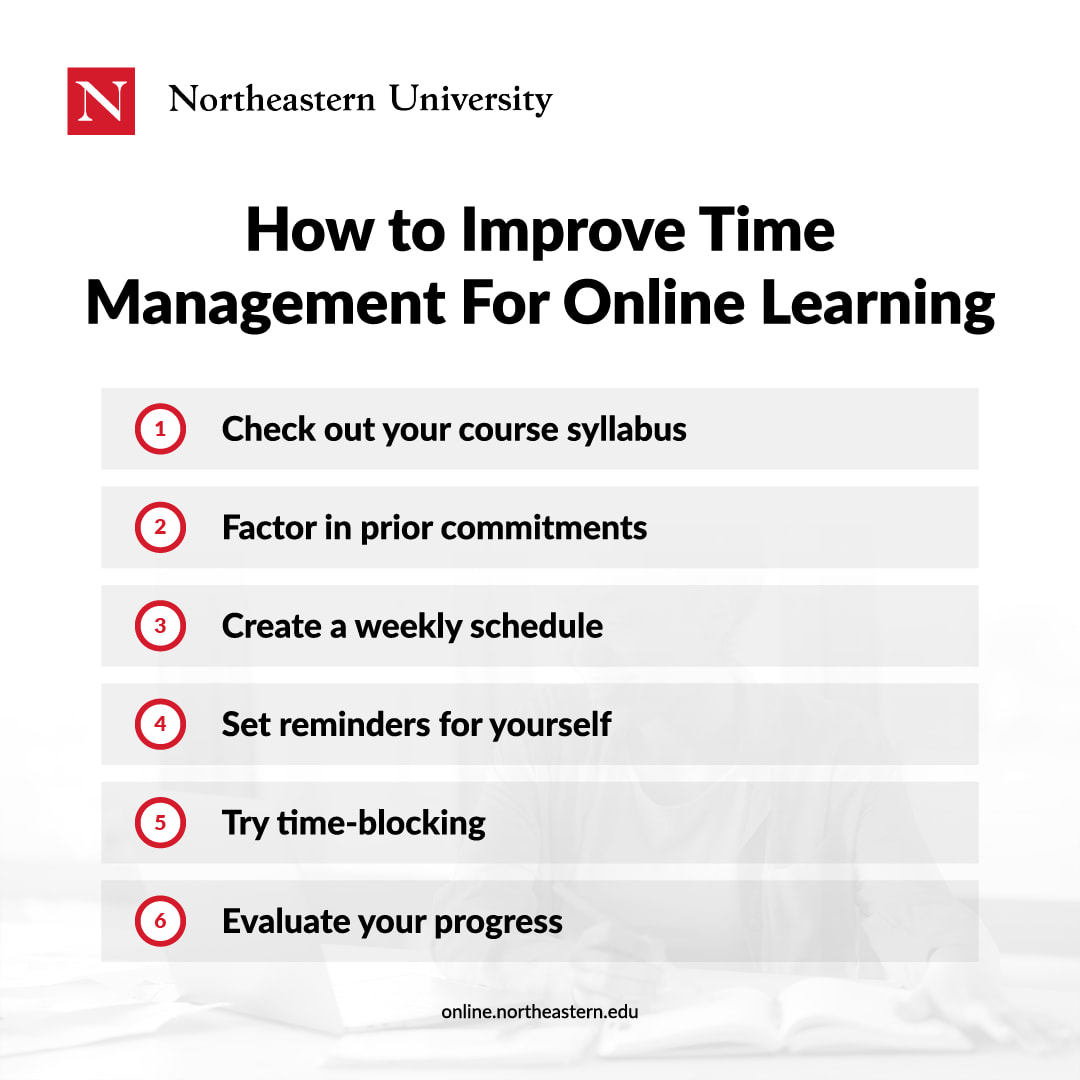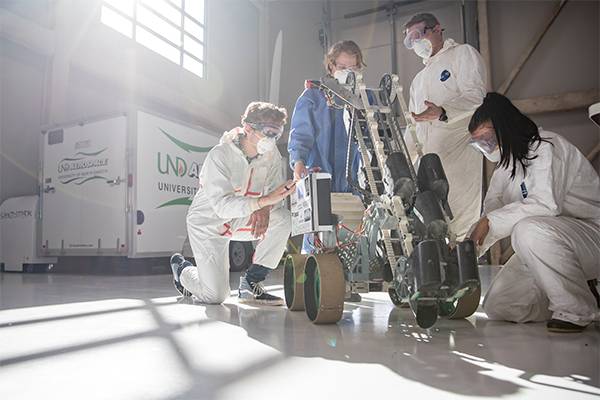How Do Online Colleges Work? Our Guide

Posted on February 23, 2023
There’s not always a clear path to higher education that fits everyone’s situation. For some, balancing work and family life with school is a necessity. For others, the cost and barriers to attending a traditional on-campus college are limiting.
No matter the reason, online colleges offer a convenient, flexible solution for people who want to earn a degree – particularly adult learners.
If you’re considering starting or returning to school in an online format, you may be wondering “how do online colleges work?” There are some differences, so here’s all you need to know about online colleges and what to expect from the experience.

Can You Do College Online?
Yes! Online college is similar to a traditional learning experience – it just takes place virtually. You can find traditional college campuses that offer online courses, as well as fully online colleges that have no physical campus. Instead, students attend classes online and complete all the necessary coursework from their own computer.
Types of Online Courses
Online learning is a broad term that includes a variety of different course structures and types. The one commonality they all have is that they are taken online with your computer and internet connection.
Asynchronous Online Courses
These types of courses don’t take place in real-time. You’re given content and assignments with a predetermined time frame to complete your assignments, including quizzes, discussions, written papers, and exams.
Typically, students interact through discussion boards, forums, or blogs. There are no assigned meeting times, just deadlines for initial posts and response posts. Students respond to each other as their schedule allows, offering a lot of flexibility for time constraints.
Synchronous Online Courses
These courses are taken online, but the instructor and all the students in the class interact simultaneously at designated times. Synchronous courses may use a webinar, video chat, audio chat, or text.
This type of learning experience mimics that of an on-campus, in-person course in a virtual environment. Students who thrive in real-time classrooms, synchronous courses allow participation for distance learners.
Hybrid Courses
Hybrid courses – also known as blended courses – are online classes that allow students to interact both in person and online. Students often attend classes together a few times during a semester while the rest is online with computer-based interaction.
Naturally, hybrid courses require you to be close to the campus location or willing to travel. It’s important to pay attention not any in-person requirements for your online learning program.
Self-Paced Courses
Self-paced courses – also known as on-demand courses – are made up of content, lecture recordings, reading materials, and presentations that students can proceed through at their own pace.
Despite the name, self-paced courses may have a predetermined time frame or a final date in which all coursework must be completed. The rest of the assignment deadlines are often flexible, so you can complete them when you feel comfortable and prepared. It can be challenging to stay disciplined, however, so some courses have recommended assignment due dates to help you stay on track.
How Do Online Classes Work?
Now that you know some of the common setups for online colleges, here’s what you can expect for the day-to-day experience.
As mentioned, the structure of online classes varies by type and institution. But in general, students log in to a learning management system or virtual portal to access the syllabus and course materials, view grades, monitor feedback, interact with classmates, and contact professors.
The learning platform and materials are provided, either as part of the tuition or for a separate fee, but you will need computer access, a reliable internet connection, and some common software, such as a word processor like Microsoft Word. Some courses are mobile compatible as well, so you can complete your work from anywhere with an internet connection.
Learning Resources
Any course materials you need will be available for purchase in advance or provided for you through the learning platform. Different courses use different types of resources, including video lectures, audio recordings, presentations, a textbook, and articles. You’ll also learn through the experience of discussing the course concepts with classmates on discussion boards or forums.
Assignments
A lot of online courses have assignments with set due dates that you can submit online. They may be quizzes and exams – often timed – and writing assignments. For the latter, you will likely upload your written assignment from a word processor like Microsoft Word or Google Docs.
Student Interactions
Because students don’t spend time in the classroom for most online learning, a lot of online programs use discussion boards, forums, blogs, groups, or chats that facilitate interactions. There may be a prompt that covers the course concepts, giving you an opportunity to share your knowledge, and respond to the insights of others.
Like traditional college, the grading for online courses is either A to F or pass/fail. They may be based on a straightforward exam or quiz, such as multiple choice or true or false questions and answers. For short answers, discussions, and written assignments, there may be a rubric that you can use to guide your assignment and understand the professor’s expectations.
What to Know About Online College
Now that you know how online college classes work, here are some things to expect:
It’s Challenging
Online college isn’t the “easy way out.” You have to put in the work, just like a traditional college, and you need strong time management skills.
It’s Flexible
Some students have a better learning experience with online classes that offer flexibility. It’s important to consider your options and choose the right online learning structure for your needs.
There’s Teamwork Involved
Just because a course is online doesn’t mean that you won’t interact with other students. Some courses have group assignments or pair assignments. You’ll also interact with other students in discussions and chats.
Is Online College Right for You?
If you’ve ever wondered “ How do online college classes work ?” and whether they’re right for you, this guide has you covered. It’s always best to ask your academic advisor if online schooling is right for you. Our learning coaches at Sophia are here to help as well.
Ready to take the first step? Start a free trial at Sophia Learning or take a look at our online university partners .
Category: Higher Education

Subscribe to our blog
About once a month, we'll send you Sophia news, educational insights, and more. Only the good stuff - we promise.
*All fields are required.
Go back to school with Sophia with 25% off your first month.
Use code BTS2024 by 9/16.
The discount provides 25% off the first month. After the first month, you will be charged our normal $99 per month membership subscription fee, unless canceled.
- Privacy policy
- Cookie policy
- Terms of use

Tips for Taking Online Classes: 8 Strategies for Success

In the past, earning a college degree meant physically attending in-person classes, which often posed challenges for working professionals or those with complicated schedules. Now, thanks to advances in technology, it’s easier than ever to find a degree program that offers the flexibility you need, whether through traditional in-person classes, online learning, or a blend of the two.
There are many advantages to online courses ; they allow you to learn whenever, wherever, and however works best for you, making it easier to earn a degree while balancing work and family commitments . And without having to attend classes in person, online learning affords you access to top degree programs across the country that might have otherwise been inaccessible or highly inconvenient.
Online classes can present unique challenges, however, if you’re not prepared. But if you develop skills for effective online learning, you’ll find the courses can be an excellent alternative to a traditional classroom setting. Here are some tips for online learning success to make sure you get the most value out of your next class.
Tips for taking online classes
If you’re considering taking online college courses (or you’re already enrolled in a program), the tips and advice below can help you address their unique challenges to get the most value out of your online program.
1. Treat an online course like a “real” course.
When it comes to online classes, you need to have the discipline to sit down and say, “I am going to work on this,” as well as the dedication to actually followthrough. Though you can be flexible as to when you choose to complete your work during the week, you can’t put it off indefinitely.
One of the easiest ways to ensure follow-through is to remember that you are paying to take this online course, just as you would for a traditional in-person class. You must “show up” if you’re going to get real value out of your class. Treat your online classes the same way you would a face-to-face class—or, better yet, a job—and you’ll be off to the right start.
2. Hold yourself accountable.
Set goals at the beginning of the semester, and check in with yourself weekly. In a traditional classroom setting, you’ll often receive verbal or visual reminders of an assignment’s upcoming due date. But without a professor actively reminding you, it’s up to you to make sure you’ve allotted enough time to complete the work so you’re not starting an assignment the day before it’s due.
If you’re having trouble holding yourself responsible, pair up with a fellow classmate, or enlist the help of a spouse or friend to check in as an accountability partner. By being organized, proactive, and self-aware, you can get the most from your online class even when life outside of school becomes chaotic.
3. Practice time management.
The flexibility to create your own schedule is often one of the biggest appeals of taking online classes. But that freedom can also be detrimental if you do not have solid time management skills. Without them, you might easily find yourself cramming before classes or handing in subpar assignments.
Though how you manage your time will depend on your schedule, learning style, and personality, here are some universally valuable tips to help you practice and improve your time management skills :
- Look at the syllabus at the start of the semester, and make note of major assignments . Mark them on a calendar you check regularly so you know what workload is coming in the weeks ahead. Don’t forget to factor in prior commitments that may interfere with your regular study schedule, such as weddings or vacations, so you can give yourself enough extra time to complete assignments.
- Create a weekly schedule that you follow , designating certain hours each week to reading, watching lectures, completing assignments, studying, and participating in forums. Commit to making your online coursework part of your weekly routine, and set reminders for yourself to complete these tasks.
- When working on your assignments, try time-blocking , allotting yourself a certain amount of time for each task before moving on to the next one and setting a timer to keep yourself accountable.
- Check in periodically throughout the term , and look at how you’re spending your time. Ask yourself: How much time am I dedicating to course reading and assignments? Am I regularly underestimating the time it’s taking me to get things done, forcing me to cram the nights before the exams? A little self-reflection and adjustment can go a long way.

4. Create a regular study space, and stay organized.
Set up a dedicated learning environment for studying. By completing your work there repeatedly, you’ll begin to establish a study routine. Whether your workspace is your kitchen table, a library, or the corner booth in a local coffee shop, it’s important to determine what type of environment will work best for you. Experiment to discover which type of setting boosts your productivity. Wherever you choose, make sure there’s high-speed internet access so you’re not trying to take an online course over a lagging connection.
Setting up a regular workspace or office will also help you to stay organized. Knowing exactly where important dates, files, forms, syllabi, books, and assignments live will help keep you on track toward hitting your goals. When setting up your dedicated study space, make sure you:
- Have a high-speed internet connection.
- Have the required books, materials, and software for the course.
- Have headphones for listening to lectures or discussions (especially in shared spaces).
5. Eliminate distractions.
From Netflix to social media to dishes piling up in the sink, you’ll be faced with many distractions that can easily derail your studies. The best online students know how to lessen these distractions and set aside time to focus.
Exactly how much of a challenge these distractions will prove to be will depend on your own unique personality and situation. Some might find that they can tune out a noisy home by listening to music. Others might choose to work from a local coffee shop or library to eliminate their urge to multitask at home. Ultimately, you will need to find a strategy that works best for you.
Regardless of where you choose to work, consider turning your cell phone off to avoid losing focus every time a text message or notification pops up. And if you’re still having trouble resisting the temptation to check your email or surf the web, try downloading a website blocker. Using applications like Cold Turkey and Freedom can help eliminate distractions by blocking the apps or websites that tend to compete for your attention, such as Facebook and Twitter.
6. Figure out how you learn best.
Once you’ve established where you’ll learn, think about when and how you accomplish your best work. If you’re a morning person, make time to study first thing. More of a night owl? Set aside an hour or two after dinner to cozy up to your computer. If the kids require your morning and evening attention, try to carve out a study session mid-day while they’re at school. Brew your usual cup of coffee, put on your go-to playlist, and do whatever you need to get into the zone and down to business. Not everyone learns the same way, so think about what types of information help you best grasp new concepts, and employ relevant study strategies. If you’re a visual learner, for example, print out transcripts of the video lectures to review. Learn best by listening? Make sure to build time into your schedule to play and replay all audio- and video-based course content.
7. Actively participate.
Participate in the course’s online forum to better understand course materials and engage with fellow classmates. This might involve commenting on a classmate’s paper on a discussion board or posting a question about a project you’re working on. Read what other students and your professor are saying, and if you have a question, ask for clarification. Practicing these strategies can also foster greater relationships with your online study partners. Make sure you are checking in as often as you can, too. The flexibility of remote learning means that if you have 30 minutes before dinner plans, you could squeeze in a discussion response around your schedule. Set a goal to check in on the class discussion threads every day.
And if you do feel yourself falling behind, speak up. Don’t wait until an assignment is almost due to ask questions or report issues. Email your professor, and be proactive in asking for help.
8. Leverage your network.
Online classes may sometimes make you feel like you are learning on your own, but this couldn’t be further from the truth. Most online courses are built around the concept of collaboration, with professors and instructors actively encouraging students to work together to complete assignments and discuss lessons.
Build relationships with other students by introducing yourself and engaging in online discussion boards. Your peers can be a valuable resource when preparing for exams or asking for feedback on assignments. Don’t be afraid to turn to them to create a virtual study group. Chances are good that they will appreciate it just as much as you will.
Practice makes perfect
Online classes are an excellent option to help you earn that degree you need to fulfill your goals. Though they come with their own unique challenges, following the advice above can help you be successful even in the most chaotic of times.
For more on how to be a successful online learner, explore our related online learning tips and advice posts , or watch the recorded webinar below.
Explore Northeastern’s Online Learning Experience
Learn what it’s like to take a class online, get tips for excelling in an online learning environment, and more.
Watch the Webinar
Editor’s Note: This post was originally published in March 2020 and has since been updated for relevancy and accuracy.
Subscribe below to receive future content from the Graduate Programs Blog.
About shayna joubert, related articles.

Online vs. On-Campus Classes: Which Is Right for You?

7 Advantages to Earning Your Master’s Degree Online

Finding the Right Online Graduate Program for You
Did you know.
Advanced degree holders earn a salary an average 25% higher than bachelor's degree holders. (Economic Policy Institute, 2021)
Northeastern University Graduate Programs
Explore our 200+ industry-aligned graduate degree and certificate programs.
Most Popular:
Public health careers: what can you do with an mph, 7 international business careers that are in high demand, edd vs. phd in education: what’s the difference, 7 must-have skills for data analysts, in-demand biotechnology careers shaping our future, the benefits of online learning: 8 advantages of online degrees, how to write a statement of purpose for graduate school, the best of our graduate blog—right to your inbox.
Stay up to date on our latest posts and university events. Plus receive relevant career tips and grad school advice.
By providing us with your email, you agree to the terms of our Privacy Policy and Terms of Service.
Keep Reading:

Top Higher Education Conferences To Attend in 2024

Grad School or Work? How To Balance Both

Is a Master’s in Computer Science Worth the Investment?

Should I Go to Grad School: 4 Questions To Consider

Choose Your Test
- Search Blogs By Category
- College Admissions
- AP and IB Exams
- GPA and Coursework
How Do Online Classes Work? Are They Right for You?
College Info

Online classes can provide a convenient and cost-efficient alternative to traditional, face-to-face classes for people who want to further their education . But how do online classes work, exactly?
Most people are aware that online classes are probably different from in-person courses, but many aren't sure what the process of taking an online course is like. To help you develop a working knowledge of how online classes work and what to expect from online courses before you decide to enroll , we're going to cover the following:
- Explain what online classes are and where you can take them
- Answer the question, "How do online college classes work?" by explaining how to enroll and attend online classes
- Discuss what a typical class session is like in an online class as well as go over how online assignments work
- Provide a 5 question quiz to help you determine if online classes are a good fit for you
- Give you 5 tips for succeeding in online classes
So, how do online classes work, and how do you do online classes? Let's find out!

Traditional, in-person classes aren't a good fit for everyone. Online courses can accommodate your schedule and learning style while still giving you a high-quality education.
What Are Online Classes?
An online class is a course that is conducted online through digital devices using web applications.
With online classes, you'll never have to set foot in a physical classroom. Every aspect of the class, from course lectures to exams, happens online. Some schools have dedicated apps for online learning, while others will require you to sign in to a website through a web browser. Regardless, signing up for an online class means you'll be learning from a distance. (That's why online learning is sometimes called "distance education.")
One quick note: while we'll focus on online college-level courses offered through community colleges and universities in this article, those aren't the only types of online classes out there! Plenty of trade schools and nonprofit institutions offer online classes, too . Luckily, most online classes operate in very similar ways. So if you're looking into a less common type of online class, the information in this article should still be helpful!

While Google is a great place to start your search for online classes, make sure you're checking individual schools' websites for more information. A little research can help ensure you're making the best decision for you.
Where Can You Find Online Classes?
Part of answering the question, "How do online classes work?" involves explaining where you can find online classes. Different types of organizations and institutions offer online classes, but the most common type of online class is the online college class . If you are interested specifically in earning college credit through online classes, the best place to search for online classes is through individual schools' websites.
Luckily, most colleges and universities in the U.S. offer online classes in multiple subject areas, but they might not offer online versions of all of the classes in a given subject area, major, or degree program. If you want to enroll in a traditional undergraduate program and take a few online classes on your path to earning your degree, you can do just that.
An alternative to enrolling in a traditional undergraduate degree program and cherry-picking online classes is to enroll in an online degree program . An online degree program allows students to earn undergraduate college degrees solely by taking classes online. In this case, every single class you take will be an online course. This can be a great option for people who have other full-time obligations, like a job or family care. It's also a good option for people who live far away from college campuses or want a degree from a specific institution.
The first step to locating online classes is deciding whether you want to take a couple of online classes at a time or if you want to enroll in an entire online degree program . Once you figure that out, you can start looking for accredited institutions that offer the type of online classes that fit your needs and your schedule.

How Do You Enroll in Online Classes?
Once you've found the online classes you want to take, it's time to sign up! The online enrollment process is actually a lot simpler than you think.
The Enrollment Process
The first step to taking an online class is enrolling in one. To do that, you have to complete the online registration process that is required by the college or university you choose. The way you go about enrolling in online classes is determined by the type of student you are: degree-seeking student or non-degree seeking student.
At most colleges and universities, degree-seeking students are students who are currently enrolled in an undergraduate or graduate degree program. Degree-seeking students are students who have gone through the admissions process and are now qualified to earn a degree from their school or university.
Degree-seeking students typically enroll in online classes by reviewing the online course offerings for a given semester in their university's course catalog, contacting their academic advisor, and registering for the online course using correct course numbers through their university's online registration system.
Non-degree seeking students, on the other hand, are students who are not admitted to or enrolled in a campus-based degree program but who would like to take an online class . That's right--on many college campuses, you can take classes without working toward a specific degree!
Typically, a college or university will provide specific registration instructions for non-degree seeking students who wish to take online classes. On some campuses, non-degree seeking students have to register for classes using a different process or through a separate online portal. Knowing your student status is key to making sure you're registering for your online courses correctly.
Paying for Online Classes
Regardless of whether you're taking online classes to earn a degree or not, you'll most likely have to pay for them . (There are exceptions to this rule, which we'll talk about in a second.)
The cost of an online course varies from school to school. In some cases, online classes can be cheaper to take than their in-person counterparts. But that's not always true! If you're looking into online classes because of your budget, make sure you're calculating the real cost of attendance before pulling the trigger on registration .
The good news is that if you're taking an online class from an accredited institution, student aid packages like federal grants, scholarships, and private loans can usually be used to cover the cost of attendance. It's definitely worth learning more about whether you qualify for financial aid before you start enrolling in your online courses.
Can You Take Online Classes for Free?
You may have heard that you can take online college classes for free. There are definitely colleges and nonprofit organizations that offer free online courses! These are called MOOCs, or Massive Open Online Classes , and they're usually offered at low to no cost.
While free online courses are tempting, they come with a few caveats. The first is that if you're trying to earn a degree, the classes you take through a MOOC or an equivalent don't always transfer to more traditional universities. You definitely don't want to take four or five MOOCs only to find out that your university won't accept the transfer credits!
Also, the quality of MOOCs varies widely, so you'll have to be pretty particular about what types of classes you're taking and the places you're taking them from. Unfortunately, not all MOOCs are created equal . It's always best to take MOOCs that are offered by accredited institutions to make sure you're getting a quality education.
But if you aren't sure about this whole "online classes" thing and want to test one out without spending a lot of money, a MOOC can be a great online class option for you. If you're interested in taking a MOOC, check out our list of the best free online classes to get you started .

How Do Online Classes Work? A General Overview
Once you've signed up for classes, it's time to get to work. But many people are confused about how online classes work on a practical level. How do you attend lectures? How do you turn in assignments? And do you have to show up at a certain time every day?
If you're asking "how do online college classes work," don't worry. This next section will help you get a handle on what being in an online class is really like.
Before we get started, though, we want to make sure you know that this is just a general overview of how online classes work. There are many different approaches to online learning out there, so it's important to research individual classes and/or online programs to make sure they're a good fit for you before you enroll.
With that said...let's answer some of the most frequently asked questions about how online classes work.
Do You Have to Attend Online Classes?
In online courses, the expectations for attendance depends on the type of online course you're taking.
There are two main types of online courses: self-guided online classes and instructor-led online classes. In both self-guided and instructor-led online classes, students "show up" to classes through a Learning Management System (LMS), which is a "digital classroom" where you'll watch lectures, submit assignments, and even take your exams.
In self-guided online courses, the instructor will provide all course materials through the LMS, and students complete the course at their own pace and on their own time. As long as students complete all of the course requirements by the end of the semester, they will be able to successfully complete the course. In other words, in self-guided courses, "attendance" looks like completing all of the required coursework by the final deadline for completion of the entire course. You don't have to show up every day at a certain time—you're able to fit your coursework around your busy schedule.
In instructor-led courses, the instructor sets deadlines for meeting course requirements . In this type of course, the instructor might host live lectures or discussions that students must attend by logging into the LMS at specific times on specific days. The instructor may also set due dates for homework assignments and course exams throughout the semester. So while you may not have to show up to a physical classroom, instructor-led courses work a lot like their in-person counterparts.
When you're signing up for online classes, it's important that you pay attention to the class format. The format (self-guided or instructor-led) should be specified on the course descriptions in a university's course catalog. When you get ready to enroll in classes, you should consider whether the more flexible self-guided "attendance" expectations seem like a better fit for you, or if having the built-in structure and accountability of an instructor-led course might better suit your learning needs! Making sure you're taking the right style of online class can make a huge difference in your overall success.

Many online classes have video lectures that you'll be required to watch. Instructor-led classes may even livestream lectures, so you'll have to log on at a specific time to watch them!
What Is a Typical Online Classroom Like?
So, how do online college classes work on a day-to-day basis? And what's a typical classroom session like in an online class?"
If you're taking a self-guided class, then you'll have everything you need to learn the course material provided to you through the LMS as soon as you enroll. There will probably be instructional videos for you to watch along with homework assignments you'll submit after watching them. You'll also likely have bigger assessments, like exams, that help ensure that you're actually learning the material.
Since you're learning at your own pace, there's no typical "day" in a self-guided class ! You can choose to do as much—or as little—as you want during any particular class session. You have the freedom to create your own learning experience.
Instructor-led classes run more like in-person courses, which means that you'll likely have a more formal "classroom experience." While instructor-led online class sessions can vary in format depending on a school's policies and the instructor's personal teaching style, there is a common pattern that most online classroom sessions tend to follow in instructor-led classes.
In online classes that require students to "attend" class sessions, the class session format typically involves a lecture given by the instructor, followed by a discussion session involving you and your fellow students. The instructor might have a designated time every week when they will give a live lecture, using video conferencing or an audio conferencing app, which students are required to attend. If you miss the lecture, then you miss that day's instruction!
Regardless of whether online courses have required sessions for students to attend at designated times, most online classes follow a recurring schedule of activities and assignments on a week-to-week basis . Many online classes will distribute readings, post slides, and assign homework at the beginning of the week. Students will then complete the assignments and turn them in by their assigned deadlines. Exams also tend to happen on a set schedule: instructors will upload the exam, and then students usually have 24 to 48 hours to complete it.
Even though instructor-led classes have more structure, they are generally more flexible than in-person classes. Assignments tend to have longer windows to complete them, and you can normally turn in your assignments any time before midnight on the day they're due. The goal of an instructor-led course is to give you the experience of learning from an expert while still providing the flexibility you need to fit the class into your own schedule.

Sorry to be the bearer of bad news, but most online classes have student assessments like homework, assignments, quizzes, and exams!
What Do Assessments Look Like in Online Classes?
Just like in traditional classes, online classes have assessments that students must take to demonstrate that they are mastering the course material . In fact, the assessments in online classes really aren't that different from the assessments in traditional classes--you just have to complete all of them online instead of in person!
Quizzes and Tests
The most common types of assessments in online classes are quizzes and tests . In self-guided courses, students can take quizzes and tests on their own time and at their own pace. In instructor-led courses, quizzes and tests may be made available at specified times, and may be "closed" at set times as well.
Regardless of whether you're taking a self-guided or instructor-led course, you'll have to use the LMS to access, complete, and submit the quizzes and tests. The frequency of these assignments varies from course to course, but you can generally expect weekly quizzes with three or four exams over the course of a semester.
Discussion Posts
Discussion boards are also a key assessment tool in many online classes. Discussion boards are used to assess students' comprehension of learning materials and to promote critical thinking about course readings and topics. It's common for instructors to post a question or prompt on the class discussion board on a weekly basis and require students to write and post a public response. Students will then comment on or respond to each other's posts to get a discussion going throughout the week. Generally, discussion posts are treated like homework in terms of your overall grade, which means you'll have a little more time to complete them than you would an exam.
Also, don't be surprised if you're required to submit essay assignments! Essay assignments are much more common in instructor-led classes, though they pop up in self-guided online classes, too. Essay assignments allow instructors to make sure you're understanding the course's core concepts and that you're able to apply them to other ideas, too.
In some classes, essays may make up the majority of your course grade. That's especially true if you're taking humanities courses like composition, literature, history, and political science. If that's the case, your instructor may also ask you to participate in a process called peer review. You'll upload a draft of your essay, then your fellow classmates—usually selected by your professor—will offer suggestions and feedback on your work through the LMS. Once that's done, you can revise and submit your final essay.
The big thing to remember is that like all of your assignments, your essays will be submitted digitally (and you'll get feedback the same way).
Final Projects
A final assessment tool that is used in many online classes is the digital project. Digital projects are frequently assigned toward the end of an online course as a way for students to show what they've learned over the course of the semester. Since online classes don't meet face-to-face, instructors in online courses might assign projects such as video essays, PowerPoint or slide-based presentations, podcasts, or electronic research papers or reports. These online projects may be research-based or collaborative, so instructors will encourage students to work together to complete course projects using tools provided in the LMS, such as group sites, chat tools, or web conferencing tools.
In the case of all assessments in online courses, the instructor will use the LMS to evaluate and assign grades to each student's completed assignments . Students will be able to access their grades and feedback on coursework through a gradebook that is built into the LMS.
How online classes work in regard to assessments can vary, but most online classes make use of similar activities and tools to help students learn and further their education!

Will Online Classes Work for You? A 5-Question Quiz
Maybe you're still unsure if online classes would be a good fit for you. To help you decide, you can take our five question quiz below!
- Are you self-motivated? A. Yes! B. Uh, not really...
- Are you able to meet deadlines on time? A. Absolutely. I'm a stickler for deadlines. B. Deadlines? What's a deadline?
- How good are you at learning new software and web apps? A. I'm definitely up for it! I'm no Bill Gates, but I'm pretty tech savvy. B. Spending tons of time figuring out new software feels like a waste of time.
- Can you learn new concepts on your own? A. For sure. I always made better grades on my homework, and I hated group assignments. B. Man, group assignments were my favorite part of school. I'd rather work with other people than try to learn things on my own.
- Do you have access to a reasonably new computer and reliable internet access? A. Yes, I have both at home. There's also a library close to my work that I could use in a pinch. B. I have data on my phone, but that's about it.
Did you answer all five questions? If you chose "A" in response to three or more questions, then it's pretty likely you'll succeed in online classes!

How Do You Do Excel in Online Classes? 5 Tips for Success
Doing well in online classes is about more than understanding how they work. That's why we're giving you our top five tips for succeeding in online classes!
Tip 1: Get Used to "Checking In" Frequently
Actively engaging with your online course is a key part of succeeding in an online class . Because you don't have to show up to a classroom two or three times a week, you'll have to make sure you're checking for class updates on a regular basis.
Here's what we mean: in order to stay on top of course expectations and deadlines, you'll need to check your email, the course announcements page in the LMS, and your syllabus often . When you're not attending an in-person class, it can be easy for deadlines and due dates to sneak up on you. Checking these resources daily will ensure you turn your assignments when they're due and have ample time to complete course readings and absorb course material. It will also help you plan for future assignments so that you're not scrambling to complete them at the last minute!
Tip 2: Do All the Reading
Since you don't have face-to-face reminders from your instructor in online classes, it's important to thoroughly read all the materials your instructor uploads to the LMS. This includes the course syllabus and schedule, assignment instructions, uploaded readings, and feedback on your completed assignments. Paying careful attention to assignment instructions is particularly important, especially since your instructor may not go over the directions with you.
More importantly, reading all course materials carefully can also help you to ask thoughtful questions, and know when you need to follow up with your instructor for more information or clarification. Reading carefully--and reading everything ahead of time!--ensures that you'll know exactly what to do on each assessment in order to ace the class.
Tip 3: Use a Digital Planner
Since deadlines arrive quickly and frequently in online classes, it can be helpful to set up reminders on a digital calendar, to-do list, or planner to help you anticipate assignment due dates and any other important tasks in online classes. And while paper planners are great, the fact that online classes are run...well, online... means that many students find it easier to keep track of everything digitally.
Here's an example: in some classes, deadlines for a given type of assignment (like discussion posts) can fall on the same day and time each week. For instance, in an English class, you may have to post discussion questions and responses every Tuesday by 11:59 pm. To make sure you never miss an assignment, you can set a recurring reminder in your calendar to notify you a few hours before each discussion post is due.
In some cases, LMS systems have built-in planners and to-do lists where instructors can upload assignment due dates and important reminders. If that's the case, take advantage of them! The biggest hazard in online learning is staying on track, so don't be afraid to rely on planners and to-do lists to keep you focused on success.
Tip 4: Get Familiar With the LMS System and Course Apps
The LMS system is the primary hub of online classes. There are tons of different LMSes out there, but some common ones include BlackBoard and Absorb . Because you'll do all of your learning on the LMS, it's important that you know how to use it . In fact, it's usually a requirement of the course! Your instructor definitely won't accept "I didn't know where to find the information" as an excuse for late work in an online class.
Many online classes also ask students to use different web apps within the course's LMS to complete coursework or interact with the instructor or classmates. These web apps can include video conferencing software, blogs and wikis, and chat tools. Again, it's your responsibility to make sure you know how to use these different tools, so you'll want to spend some time familiarizing yourself with them before you have to complete assignments.
If you feel apprehensive about using apps or other digital tools that you're unfamiliar with, it might be worth it to spend some time browsing around the LMS and testing things out before the class actually begins . That way, you'll be able to ask your instructor questions or consult your school's tech support if you need help!
Tip 5: Communicate With Your Instructor and Your Peers
Perhaps the most important thing you can do in online classes is to communicate clearly and often with your instructor and your classmates . If you feel confused or uncertain about the expectations for an assignment, email your instructor or request a meeting during their virtual office hours to discuss your concerns ( after reading the entire syllabus and other written instructions, of course).
Just because online classes are a form of distance learning doesn't mean you can't ask your instructor for help , form study groups with your peers, or have meetings to talk about your progress in the course. That's what all of those chat tools and web conferencing apps are for: helping you stay connected and in sync with your instructor's expectations, even if it's from a distance.

What's Next?
One of the best ways to succeed in an online course is to make sure you're managing your time well . Here are twelve time management techniques that can help you ace your classes. Just because a class is online doesn't mean you won't have to study!
Studying regularly helps you retain course information, which is super important if you want to make great grades on your quizzes and exams. Follow these expert study tips to keep your studying on track.
Remember how we mentioned that online college courses are just one type of online class you can take? Well, it turns out that you can go to high school completely online, too ! Here's a complete list of free online high schools , and a bonus guide that can help you figure out if an online high school is right for you .

Trending Now
How to Get Into Harvard and the Ivy League
How to Get a Perfect 4.0 GPA
How to Write an Amazing College Essay
What Exactly Are Colleges Looking For?
ACT vs. SAT: Which Test Should You Take?
When should you take the SAT or ACT?
Get Your Free

Find Your Target SAT Score
Free Complete Official SAT Practice Tests
How to Get a Perfect SAT Score, by an Expert Full Scorer
Score 800 on SAT Math
Score 800 on SAT Reading and Writing
How to Improve Your Low SAT Score
Score 600 on SAT Math
Score 600 on SAT Reading and Writing
Find Your Target ACT Score
Complete Official Free ACT Practice Tests
How to Get a Perfect ACT Score, by a 36 Full Scorer
Get a 36 on ACT English
Get a 36 on ACT Math
Get a 36 on ACT Reading
Get a 36 on ACT Science
How to Improve Your Low ACT Score
Get a 24 on ACT English
Get a 24 on ACT Math
Get a 24 on ACT Reading
Get a 24 on ACT Science
Stay Informed
Get the latest articles and test prep tips!

Ashley Sufflé Robinson has a Ph.D. in 19th Century English Literature. As a content writer for PrepScholar, Ashley is passionate about giving college-bound students the in-depth information they need to get into the school of their dreams.
Ask a Question Below
Have any questions about this article or other topics? Ask below and we'll reply!
How does virtual learning impact students in higher education?
Subscribe to the brown center on education policy newsletter, stephanie riegg cellini stephanie riegg cellini nonresident senior fellow - governance studies , brown center on education policy.
August 13, 2021
In 2020, the pandemic pushed millions of college students around the world into virtual learning. As the new academic year begins, many colleges in the U.S. are poised to bring students back to campus, but a large amount of uncertainty remains. Some institutions will undoubtedly continue to offer online or hybrid classes, even as in-person instruction resumes. At the same time, low vaccination rates, new coronavirus variants, and travel restrictions for international students may mean a return to fully online instruction for some U.S. students and many more around the world.
Public attention has largely focused on the learning losses of K-12 students who shifted online during the pandemic. Yet, we may have reason to be concerned about postsecondary students too. What can we expect from the move to virtual learning? How does virtual learning impact student outcomes? And how does it compare to in-person instruction at the postsecondary level?
Several new papers shed light on these issues, building on previous work in higher education and assessing the efficacy of online education in new contexts. The results are generally consistent with past research: Online coursework generally yields worse student performance than in-person coursework. The negative effects of online course-taking are particularly pronounced for less-academically prepared students and for students pursuing bachelor’s degrees. New evidence from 2020 also suggests that the switch to online course-taking in the pandemic led to declines in course completion. However, a few new studies point to some positive effects of online learning, too. This post discusses this new evidence and its implications for the upcoming academic year.
Evaluating online instruction in higher education
A number of studies have assessed online versus in-person learning at the college level in recent years. A key concern in this literature is that students typically self-select into online or in-person programs or courses, confounding estimates of student outcomes. That is, differences in the characteristics of students themselves may drive differences in the outcome measures we observe that are unrelated to the mode of instruction. In addition, the content, instructor, assignments, and other course features might differ across online and in-person modes as well, which makes apples-to-apples comparisons difficult.
The most compelling studies of online education draw on a random assignment design (i.e., randomized control trial or RCT) to isolate the causal effect of online versus in-person learning. Several pathbreaking studies were able to estimate causal impacts of performance on final exams or course grades in recent years. Virtually all of these studies found that online instruction resulted in lower student performance relative to in-person instruction; although in one case , students with hybrid instruction performed similarly to their in-person peers. Negative effects of online course-taking were particularly pronounced for males and less-academically prepared students.
A new paper by Kofoed and co-authors adds to this literature looking specifically at online learning during the COVID-19 pandemic in a novel context: the U.S. Military Academy at West Point. When many colleges moved classes completely online or let students choose their own mode of instruction at the start of the pandemic, West Point economics professors arranged to randomly assign students to in-person or online modes of learning. The same instructors taught one online and one in-person economics class each, and all materials, exams, and assignments were otherwise identical, minimizing biases that otherwise stand in the way of true comparisons. They find that online education lowered a student’s final grade by about 0.2 standard deviations. Their work also confirms the results of previous papers, finding that the negative effect of online learning was driven by students with lower academic ability. A follow-up survey of students’ experiences suggests that online students had trouble concentrating on their coursework and felt less connected to both their peers and instructors relative to their in-person peers.
Cacault et al. (2021) also use an RCT to assess the effects of online lectures in a Swiss university. The authors find that having access to a live-streamed lecture in addition to an in-person option improves the achievement of high-ability students, but lowers the achievement of low-ability students. The key to understanding this two-pronged effect is the counterfactual: When streamed lectures substitute for no attendance (e.g., if a student is ill), they can help students, but when streaming lectures substitute for in-person attendance, they can hurt students.
Broader impacts of online learning
One drawback of RCTs is that these studies are typically limited to a single college and often a single course within that college, so it is not clear if the results generalize to other contexts. Several papers in the literature draw on larger samples of students in non-randomized settings and mitigate selection problems with various econometric methods. These papers find common themes: Students in online courses generally get lower grades, are less likely to perform well in follow-on coursework, and are less likely to graduate than similar students taking in-person classes.
In a recent paper , my co-author Hernando Grueso and I add to this strand of the literature, expanding it to a very different context. We draw on data from the country of Colombia, where students take a mandatory exit exam when they graduate. Using these data, we can assess test scores as an outcome, rather than (more subjective) course grades used in other studies. We can also assess performance across a wide range of institutions, degree programs, and majors.
We find that bachelor’s degree students in online programs perform worse on nearly all test score measures—including math, reading, writing, and English—relative to their counterparts in similar on-campus programs. Results for shorter technical certificates, however, are more mixed. While online students perform significantly worse than on-campus students on exit exams in private institutions, they perform better in SENA, the main public vocational institution in the country, suggesting substantial heterogeneity across institutions in the quality of online programming. Interviews with SENA staff indicate that SENA’s approach of synchronous learning and real-world projects may be working for some online students, but we cannot definitively call this causal evidence, particularly because we can only observe the students who graduate.
A new working paper by Fischer et al. pushes beyond near-term outcomes, like grades and scores, to consider longer-term outcomes, like graduation and time-to-degree, for bachelor’s degree-seeking students in a large public university in California. They find reason to be optimistic about online coursework: When students take courses required for their major online, they are more likely to graduate in four years and see a small decrease in time-to-degree relative to students taking the requirements in-person.
On the other hand, new work considering course completion during the pandemic is less promising. Looking at student outcomes in spring 2020 in Virginia’s community college system, Bird et al. find that the switch to online instruction resulted in an 8.5% reduction in course completion. They find that both withdrawals and failures rose. They also confirm findings in the literature that negative impacts are more extreme among less-academically-prepared students.
Online learning in the fall and beyond
Much more research on virtual learning will undoubtedly be forthcoming post-pandemic. For now, college professors and administrators should consider that college students pushed online may be less prepared for future follow-on classes, their GPAs may be lower, course completion may suffer, and overall learning may have declined relative to in-person cohorts in previous years. These results seem particularly problematic for students with less academic preparation and those in bachelor’s degree programs.
The research is less clear on the impact of virtual instruction on college completion. Although course completion rates appear to be lower for online courses relative to in-person, the evidence is mixed on the impact of virtual instruction on graduation and time-to-degree. The negative learning impacts, reduced course completion, and lack of connection with other students and faculty in a virtual environment could ultimately reduce college completion rates. On the other hand, there is also evidence that the availability of online classes may allow students to move through their degree requirement more quickly.
As the fall semester approaches, colleges will need to make critical choices about online, hybrid, and in-person course offerings. Maintaining some of the most successful online courses will enhance flexibility at this uncertain time and allow some students to continue to make progress on their degrees if they get sick or cannot return to campus for other reasons. For those transitioning back to campus, administrators might consider additional in-person programming, review sessions, tutoring, and other enhanced supports as students make up for learning losses associated with the virtual instruction of the past year.
Related Content
Stephanie Riegg Cellini, Kathryn J. Blanchard
July 22, 2021
Daphna Bassok, Lauren Bauer, Stephanie Riegg Cellini, Helen Shwe Hadani, Michael Hansen, Douglas N. Harris, Brad Olsen, Richard V. Reeves, Jon Valant, Kenneth K. Wong
March 12, 2021
Education Policy Higher Education
Governance Studies
Brown Center on Education Policy
Phillip Levine
September 3, 2024
Zachary Billot, Annie Vong, Nicole Dias Del Valle, Emily Markovich Morris
August 26, 2024
Online only
11:00 am - 12:00 pm EDT
- EXPLORE Random Article
- Happiness Hub
How to Do Well in an Online College Course
Last Updated: June 3, 2021 Approved
This article was co-authored by Christopher Taylor, PhD . Christopher Taylor is an Adjunct Assistant Professor of English at Austin Community College in Texas. He received his PhD in English Literature and Medieval Studies from the University of Texas at Austin in 2014. There are 7 references cited in this article, which can be found at the bottom of the page. wikiHow marks an article as reader-approved once it receives enough positive feedback. In this case, 84% of readers who voted found the article helpful, earning it our reader-approved status. This article has been viewed 54,100 times.
Online courses are popular ways for students to earn college credit while balancing working and other time commitments. Since you are working through the course on your own time, it is important to follow a specific schedule and to complete your reading and assignments online. You may be taking an online class through your two or four year college or through an online college program. Regardless of the class type, there are specific things you can do to ensure that you succeed.
Making a Plan for Success

- This course will be taught at a college level. If you feel uncertain about your abilities to complete college-level coursework, this might not be the best option for you.
- If you’re not confident in your computer skills, you should consider strengthening them before taking an online course. It might be a good idea to narrow down the list of most needed skills to just a few items to make sure you can develop those skills in time before the course begins.
Christopher Taylor, PhD
Christopher Taylor, an English professor, advises: "Creating a study and assignment schedule and sticking to it is key to completing an online course."

- If you are taking this online course for a degree program, make sure that you have completed any pre-requisites for the course.
- If you are attending another college, but taking this online course through a different university, check with your university to make sure that this credit will be accepted towards your degree.
- Purchase or borrow any required textbooks or course materials prior to the start date of your class.

- If you do not meet these requirements, the online course module may not work correctly and you will be unable to complete the course. [1] X Research source Though you may be able to use a public computer, like one at the library, it’s better to have a personal computer you can rely on to complete an online course.
- Technical courses may have specific requirements for the amount of RAM, hard drive space available, and the operating system that you use.
- You will need consistent and reliable access to the Internet for your course.
- Hone and practice your computer skills if you are uncertain whether they are strong enough for the course. You can even enroll in a brief computer literacy class before starting the course.

- Before the course begins, reach out to your professor. This can be a simple email introducing yourself to the instructor and letting them know that you’re excited to begin the course with them.
- If you ever have the opportunity to speak with your professor in person, take advantage of it.

- If you work full time, see if your employer offers tuition reimbursement or tuition reimbursement. If you have an HR department, they will be the best resource for this inquiry. [2] X Research source
- If you work part time or have a flexible work schedule, ensure that your work schedule does not conflict with your study schedule or any scheduled class times.
- If you have children at home, arrange childcare before the course begins. It can be very difficult to focus on online coursework if you are caring for children at the same time. Arrange for consistent childcare during the times you know will be doing coursework and studying. [3] X Research source
Managing Your Time

- If you plan to do classwork at home, make sure that you will not be distracted by family members or roommates while you’re working.
- Cafes and coffee shops usually have consistent Internet access. Check with the owner to make sure that you are able to occupy a table for extended amounts of time.
- Libraries are a good option if you prefer to work in a quiet space. Many have desktop computers available for your use, which is helpful if you do not have a laptop.
- Many public parks offer free wifi. You may find it relaxing to study in the park, as long as there are no distractions nearby.

- Many online courses require online assignment submissions to be made by a certain time. If each weekly assignment is due at 5pm on Sunday, make sure to note this specific time so you can keep your assignment submissions organized.
- Use a paper planer or online calendar to keep all of your assignment dates organized and accessible.
- If you are taking more than one course at a time, create a master list that has each of your course assignment due dates listed.
- Each week, organize your schedule and make a priority list for assignments that are due that week.

- Be as detailed as possible in your schedule. Plan ahead and take in to account any outside commitments that you’ve made like vacations or doctors visits that will disrupt your normal schedule.
- Use the list of assignment due dates that you wrote down at the beginning of the course to set aside time to study for large exams and to complete projects or papers.
- Stick to the schedule that you set for yourself. You will need to follow your schedule to accomplish your coursework on time.
- Create weekly to-do lists that map out your assignment deadlines and required coursework. [4] X Research source

- Be prepared to take notes during each online lecture. Organized and detailed notes will be your best study tools to prepare for exams. It can be tempting to zone out or not pay attention during online lectures since you aren’t physically in a classroom, but taking notes can help you to avoid this temptation.
- Keep your notes in a centralized and organized space. If you take notes by hand, dedicate a large notebook or binder to holding all of your notes. If you take notes on your laptop, create an online file to hold all of your notes in one place.

- Online courses are great for independent learners since you are held accountable for your ability to follow a syllabus and meet deadlines outside of a physical classroom. You must reliably meet deadlines and turn in your work on time. Missing deadlines can have a large negative impact on your grade. [6] X Research source
- Plan ahead if you know that you have a busy week coming up so you won’t have to struggle to get your work done.
Communicating With Your Classmates and Professors

- Posts on a discussion board often count as participation points and are an important part of your grade.
- Consistently post your responses or assignments to the discussion board on time and make meaningful additions to the discussion.
- Class discussions are also a great way to connect with your online classmates.

- Some online classes may require group work during the course. While it can be challenging to complete assignments with students that you cannot physically meet with, group work is a great incentive to connect with your online classmates.
- Reach out to the online university that you are taking the class through. Many universities offer community websites and ways to connect with other online learners. [7] X Research source
- If you find that you can meet with another online classmate in person, take this opportunity to get to know your classmate and arrange for a group study session.

- Since most of your communication with your professor and peers will be through writing, you must be comfortable reaching out through written communications like email. [8] X Research source
- Always keep your communications with professors professional and courteous, just as you would with any other instructor.
- Do not hesitate to reach out to the professor if you are struggling to understand a class concept or if you have questions.
Expert Q&A

- Submitting assignments early ensures you don’t miss a due date do to a computer glitch. Thanks Helpful 0 Not Helpful 0
- Practice good time management skills to balance your workload. Thanks Helpful 0 Not Helpful 0
- If you are struggling, reach out for help. Thanks Helpful 8 Not Helpful 0
- Online course work is just as difficult as any other college level coursework. Just because you are not in a classroom each week, you still must meet high expectations for your work. Thanks Helpful 5 Not Helpful 0
You Might Also Like

- ↑ http://www.usnews.com/education/online-education/articles/2013/01/14/5-tips-to-succeed-in-an-online-course
- ↑ http://www.forbes.com/sites/moneybuilder/2012/07/20/tuition-reimbursement-a-benefit-for-some-employees-and-employers/#39cb85797b91
- ↑ https://www.geteducated.com/elearning-education-blog/7-tips-for-success-in-online-courses/
- ↑ https://elearningindustry.com/10-study-tips-for-online-learners-getting-the-most-out-of-your-elearning-course
- ↑ http://www.facultyfocus.com/articles/online-education/ensuring-student-success-online-courses/
- ↑ https://www.washington.edu/trends/engaging-online-students-with-their-communities/
- ↑ http://www.ion.uillinois.edu/resources/tutorials/pedagogy/studentprofile.asp
About this article

Reader Success Stories
Terrie Marquez
Jun 14, 2018
Did this article help you?

Yadira Corhiran
Feb 26, 2021
Jessica Cleage
Mar 22, 2017

- About wikiHow
- Terms of Use
- Privacy Policy
- Do Not Sell or Share My Info
- Not Selling Info

Online Students
For All Online Programs
International Students
On Campus, need or have Visa
Campus Students
For All Campus Programs

Online Courses for College Credit
Take one of our transfer-friendly online courses to earn college credit and master new skills.
Earn college credits in as little as 8 weeks.
Whether you’re already a university student, a working professional, or you simply want to see what college is like, taking individual online courses can be a great way to earn college credits, upskill for your career, and prepare for the future—all with low cost and no long-term commitment.
.st0{fill:#21386D;} .st1{fill:#21386E;} Catch Up or Get Ahead
Online courses can help lighten the course load required by your degree program at SNHU or another university.
Transfer Your Credits
Credits you earn can transfer to SNHU degree programs, or to another university, depending on their transfer policy .
.b{fill:none;stroke:#21386d;stroke-linecap:round;stroke-linejoin:round;stroke-width:2.12px;} Upskill for Career Moves
For moving up the ladder or changing fields entirely, new skills can help make you more marketable.
Hundreds of course options
Choose from nearly 500 transfer-friendly classes , and in as little as 8 weeks, earn college credits that may be applied toward a degree at SNHU or another university. Whether you're looking for a course in business, healthcare, liberal arts, technology, or another subject, you can find it all at SNHU.
You can develop your passion for numbers and problem-solving in SNHU’s math courses. Consider a psychology course to understand psychological principles and develop insight into human thought and behaviors. Dive into courses like marketing, financial accounting and microeconomics to learn skills you could apply to the business world. Or explore your creative side with graphic design, creative writing and more.

Popular SNHU Courses—8 weeks long, 100% online.

ACC-201 Financial Accounting
Learn the steps of the accounting cycle and how to prepare financial statements in accordance with industry established rules and regulations. Develop skills needed to analyze financial accounting information, communicate this information to stakeholders, and understand the accounting procedures that produce this information.
Explore more about SNHU's:

HIM-215 Coding & Classification Systems
Learn about the central technologies, terminologies, and systems involved in Medical Coding, building the skills you need to create and maintain a central hub for all patient data in a healthcare setting—from the lab, to surgery, insurance, registries and more. Gain relevant and career-focused skills, so you can prepare for real-world success.

MKT-225 Digital Marketing
Learn the different types of digital marketing channels and business functions using digital marketing technology and tools. Topics will focus on earned, paid, and owned media and the intersection of the three. The course will also emphasize development of a digital marketing strategy and its impact on the business.

CYB-200 Cybersecurity Foundations
Gain familiarity with foundational cybersecurity concepts and terms. Learn the difference between adversarial and environmental threats and analyze how security practitioners respond to each. Explore legal and human factors and examine how they influence the development of organizational security strategies.

IT-215 Introduction to AI Literacy
Learn practical applications and ethical considerations of artificial intelligence through hands-on experience with some of the most popular AI tools, preparing you to use AI responsibly in your career and daily life. After taking IT-215, you'll be prepared to take IT-216 Introduction to Responsible AI and IT-217 AI in Practice.
Explore more about SNHU's:

PSY-108 Introduction to Psychology
Explore the complexities of the human mind, and examine the science behind why we think, feel, and do what we do. Students will experience the evolution of psychology through the early schools of thought, major branches, and core theories that guide contemporary perspectives. As students consider the broad influence of psychology on their perceptions, emotions, and everyday choices, this course aims to show that, in human experience, "psychology is everywhere."
More Popular SNHU Courses Check out more popular SNHU courses: MAT-240 - Applied Statistics This is a fundamental course in the application of statistics. In this course, students will learn to apply statistical techniques to a variety of applications in business and the social sciences. Students will learn how to solve statistical problems by hand and through the use of computer software. Topics include probability distribution functions, sampling distributions, estimation, hypothesis testing and linear regression. BIO-120 - General Biology I General biology course that includes mammalian cell structure and function, cellular reproduction and physiology, and Mendelian genetics. Laboratory exercises (BIO 120L) to follow lecture topics. BIO-205 - Human Anatomy and Physiology BIO 205 Human Anatomy and Physiology I is the first of two courses examining the structure, function, and interdependence of human body systems. The course begins at the cellular and molecular levels with a concentration on the organization of the human body as a symbiotic system. The integumentary, skeletal, muscular, and nervous systems provide focal points for case studies and discussions throughout the term. The laboratory component allows the student to integrate and apply theory based knowledge from the course to simulations and critical appraisal exercises. ECO-201 - Microeconomics This course examines the role of economic systems in allocating scarce resources to satisfy the needs and wants of individual members of a society. After a brief exposure to alternative economic systems, the focus becomes the nature and performance of American capitalism. Primary emphasis is placed upon the development of models that explain the behavior of consumers, producers and resource suppliers in various market structures. PHY-101 - Principles of Physics Principles of Physics is an algebra based course that explores the major topics in physics, such as motion and forces, gravity and projectiles, energy and work, thermodynamics, vibrations and waves, electricity and magnetism, solids and fluids, light and optics, and atomic and nuclear physics. CHM-101 - Fundamentals of Chemistry An introductory chemistry course emphasizing the contribution of chemistry in our everyday lives. This course will enable students to look at various aspects of the world around them through the lens of chemistry. It will introduce basic concepts and applications of chemistry as well as chemical topics and their relationship to matters of societal concern. SOC-112 - Introduction to Sociology Is one's identity individually or socially constructed? Are all stereotypes invalid or can there be value in generalizations? Is globalization widening the gaps or homogenizing the world? In this course, students will grapple with these essential questions in examining the world through the lens of a sociologist. Sociology offers an empirically-based methodology for critically evaluating society-from issues of individual agency to the roots of global institutions. Culture, norm stratification, systems, structure, social institutions, social change, the organization of social behavior and its relationship to society and social conditions are emphasized. Students will challenge their own preconceived notions and evaluate these constructs in terms of their relevancy to contemporary issues and problems. BUS-206 - Business Law I Students will examine the background, foundation, and ethical aspects of the United States' legal system as it applies to business organizations. Students will also learn the impact of torts, product liability, criminal law, contracts, sales, business organizations, and agency and cyber law in a business setting. BUS-210 - Managing and Leading in Business Students will explore leadership and management theories and how to incorporate them in one's own personal style for effective contribution and collaboration in diverse team environments, and learn about the skills necessary to lead in various organizational structures and areas of business. Students will also examine how the functional areas of business are interrelated and work together in organizations. MKT-113 - Introduction to Marketing This course examines the organization's functions for creating, communicating, and delivering value to customers. These functions, designed to meet customers' needs and organizational goals, include marketing research, environmental monitoring, target market selection, product selection, promotion, distribution and pricing. PSY-200 - Foundations of Addictions This course introduces students to various types of addictive behaviors as well as their causes and consequences in relation to the individual, family, community, and society. It includes an overview of theories on addiction and approaches to identification, prevention, and treatment. ENG-226 - Introduction to Creative Writing An introductory creative writing course designed to acquaint students with the craft of creative writing and the skills that will be required in subsequent creative writing workshops. Students will explore such craft issues as point of view, voice, characterization, dialogue, setting, conflict, rhythm, imagery, poetic structure, and dramatic scene development. Students will be expected to submit a number of writing exercises, including stories and poems. Students will also be expected to read and comment on their peers' writing with thoughtful and constructive criticism, as well as read and discuss published work. ENG-421 - New Media: Writing and Publishing This course introduces students to the latest trends in new media writing and publishing. Students will gain insight and practical understanding of how today's digital environment affects their field. This course will focus extensively on writing content for a variety of digital formats and employing media to showcase one's works. Not sure what course you want? Explore our academic catalog for a full list of course offerings. if (typeof accordionGroup === "undefined") { window.accordionGroup = new accordion(); } accordionGroup.init(document.getElementById('39124755fbf64eb19f6ec128a7265431')); Individual online courses start soon
Undergraduate Term starts 10/28/24
- Individual 3-credit undergraduate classes cost $990 ($330 per credit)
- 8-week terms
Graduate Term starts 10/14/24
- Individual 3-credit graduate classes cost $1,911 ($637 per credit)
- 10-week terms
Please note that financial aid is not available for students taking individual courses only. Learn more about tuition .
Why take individual online courses?
University students: Earn college credits quickly and affordably that you can transfer to a degree program at SNHU or another university. Check your university's transfer policy.
Working professionals: Learn career-focused, in-demand skills employers are looking for to help advance your career, break into an industry, or get even closer to earning your degree.
Thinking about college? Individual courses are a great way to get a feel for the online experience, and see if an online degree is right for you. And if it is, you'll have a head start on the path to your degree.
SNHU makes it easy to get started — and has been teaching online since 1995
- No application fees
- No entrance exams
- Accredited and affordable
- Terms start frequently
- Courses developed by subject experts
- Personal academic support
- 200+ transfer-friendly programs
- 24/7 tech support
- Access to SNHU Career Services while enrolled
Frequently Asked Questions
Calculate for all schools
Your chance of acceptance, your chancing factors, extracurriculars, how do most online college courses work.
Hey guys, I'm thinking about taking some online courses. But unsure of how they typically operate. Can anyone explain the general format for most online college courses?
Sure, I can help with that! Online courses can differ significantly depending on the course and the institution, but there are few commonalities.
Firstly, online courses traditionally follow an asynchronous format, which means you can view lectures, complete assignments, and participate in discussions on your own schedule. However, certain deadlines will still apply — for instance, you might get a week to complete a particular assignment or reading.
These courses usually take place via a learning management system (LMS) like Blackboard or Canvas. These platforms host course materials, including videos of lectures, reading materials, and assignments. You submit your assignments through here, and progress and grades are typically tracked on these platforms as well.
Most online courses involve some sort of discussion element. This could be a discussion board where you post responses to prompt questions and engage with the posts of your fellow students, or it could be a synchronous video conference where the class or smaller groups meet to discuss topics.
Even though online learning brings a level of convenience, keep in mind that it requires a certain level of self-discipline. It's up to you to keep up with lectures and assignments, as there might be less of a rigid structure than in-person classes might present.
Finally, communication with your instructors is usually done via email or through the LMS, although some instructors also hold virtual office hours, either on the LMS itself or via platforms like Zoom where you can ask questions and get clarifications.
Hope this gives you a bit clarity on how online courses usually work!
About CollegeVine’s Expert FAQ
CollegeVine’s Q&A seeks to offer informed perspectives on commonly asked admissions questions. Every answer is refined and validated by our team of admissions experts to ensure it resonates with trusted knowledge in the field.
- Skip to main content
- Keyboard shortcuts for audio player

- LISTEN & FOLLOW
- Apple Podcasts
- Amazon Music
Your support helps make our show possible and unlocks access to our sponsor-free feed.
How To Make The Most Of Online College This Fall

Elissa Nadworny
Audrey Nguyen

Updated at 11 a.m. ET
Millions of students are starting the fall semester online — in their childhood bedrooms, at kitchen tables surrounded by siblings or wherever they can find a quiet spot — as the coronavirus has forced more than a third of four-year colleges to teach entirely virtually.
With everything that's happening in the world, it can be hard to focus, especially if you didn't go into college with the intention of taking classes online.
But students have been taking online courses for a long time, and many have loved the experience.
Here's how to make the most of an online semester:

As Virtual Learning Continues, Some Families Struggle With Sharing Tech
1. figure out how you learn, so you can get yourself set up for success..
Jami Steimle works as a mentor for students at Western Governors University, which offers online degrees.
Steimle says it's helpful when students understand what kind of learners they are.
Ask yourself: Do you need to sit at a desk, or can you focus while kicked back on the couch? Do you work better in a quiet place, or do you prefer a bit of background noise ? Is it easier for you to focus in the mornings or at night?
Figure out how you can focus, before you log on to learn.

College Is Important. So Is Mental Health. Here's How To Study Without Burning Out
2. make a schedule..
Once you've found a good, reliable spot for your studies, it's time to plan out your days.
"Come up with a time management system — maybe even write out your days," Steimle suggests. Block out time for class, studying and life outside school.
Steimle says writing out your time commitments can help you visualize how much time you actually have, so you can make the most of it.
Some online classes are synchronous, meaning they're offered at a specific time, like most in-person classes. But others are asynchronous — meaning the time to watch recorded lectures or complete classwork is up to you.
With all these moving parts, it's even more important to plot out the timing of your days — and weeks! The clearer you are with your schedule, the easier it will be to stick to it.
If you like to use digital calendars, you can try setting up reminders so you get push notifications on your laptop, phone or smartwatch. You can use the reminders to let you know when assignments are coming up or when classes are scheduled to begin.
Once you've mapped out the timing of your days, Steimle suggests thinking about how you're going to work.

The Coronavirus Crisis
With virtual rush, fraternities and sororities race to pitch more than parties.
Are you going to do your reading one day and the discussion-board assignment the next? Or would you rather break up your reading over a couple of days and do your assignment right after you finish?
3. Seek balance and embrace the flexibility of online classes.
Michelle Krallman recently graduated from Western Governors University. She completed her bachelor's degree entirely online while juggling a full-time job for most of her time in school.
For Krallman, who lives in Denver, finding balance between school and the rest of her life was essential. She told herself she'd work for eight hours, do school work for four hours and reserve the rest of the time for herself. "The rest is mine. I can do whatever I want with it. ... It really was [about] giving myself boundaries."
Krallman and her husband love to take walks and go on hikes. Setting aside time for recreation, Krallman says, actually made it more manageable to focus on schoolwork when she had to.

College Political Activists Trade Door-Knocking For Apps To Register Voters
"It would be really easy, I think, to get so overwhelmed in classwork that I forget about all the other stuff around me. You know, learning doesn't only happen in class — it happens everywhere around us. So we have to give ourselves that space too and make sure that we take it," says Krallman.
4. Beware the Internet's rabbit holes!
We've all been there: You navigate over to a new tab, search for one thing, then click a link, which leads you to another link, then another and another. Hours later, you surface and think, "How the heck did I get here?!"
While there's no way to totally escape this while you're taking online classes, Krallman recommends a few of her own tried-and-true strategies:
- Use browser extensions to block distracting websites.
- If you have access to multiple computer monitors, try designating one section for reading, one section for writing or note taking and one section for whatever music or ambient noise you're listening to. Don't allow anything else on your screens while you're doing schoolwork!
- Disconnect from the Wi-Fi if you can.

5. Don't be afraid to make human connections.
Accountability partners can help you stay on top of work.
Having someone to check in with can make online classes feel less lonely. An accountability partner — someone who helps make sure you're doing your work and celebrates your progress — may help you do better academically.
Steimle suggests looking up the folks enrolled in class with you. Perhaps there's an email thread with everyone's names or a roster posted online. Since everyone's in the same boat as you, there's nothing to lose and a lot to gain by reaching out.

Preventing College Parties? Shame And Blame Don't Work, But Beer Pong Outside Might
Krallman says every time she has reached out to someone in a class, she has been rewarded. "When someone does take a moment to go, 'You know what? No, I'm going to make this happen. We're going to talk to each other. We're going to know each other,' there's just relief there on both sides. You know that nobody wants to be the first one to say it, but everyone's grateful that someone said it first."
If you'd rather check in with a friend or a family member, that works too. The key here is that you're talking to someone about the work you're (supposed to be) doing.
Don't be afraid to give your professors feedback or ask for help.
"The whole purpose of an instructor is that they're not just sitting there to sit there. Their goal is not just to talk. The goal is for you to learn," Krallman notes.
So don't be afraid to give your professors feedback or make suggestions about how to improve your and your classmates' online learning experience. If the class isn't going well, ask to hop on the phone or video-chat to talk about how you can improve your own work. During the conversation, you can work in suggestions about how the class itself could improve for students like you.
Remember, you don't have to talk about the class. You can just get to know each other! Talk about movies or books or share what your home life is like, so they understand who y ou are as a whole person and not just as a student sitting in their class.

Goats and Soda
Coronavirus faqs: what are the new dating rules and what about hooking up, 6. look for ways to participate in extracurriculars virtually..
Many schools that transitioned online for the fall have seen students hard at work, adapting extracurricular activities to the digital sphere.
Fraternities and sororities are conducting recruitment events virtually . There have been virtual orientations . And in the first weeks of school, some colleges are offering virtual club fairs .
Shannon Li is a junior at the University of Michigan in Ann Arbor. All of her classes are online this semester. While Li, who uses she and they pronouns, values her education, she also likes being active in her community. "There's other more important things in life than just focusing on getting that grade you want," they say.
Many of Li's extracurriculars are focused on social advocacy and volunteering, much of which can be done online . "Paying [it] forward has been really helpful in terms of balancing everything with the stress that's going on," they say.
One way to stay connected to your campus community? Check your university email for online events and opportunities to get involved with things. Poke around social media to see how different clubs and organizations are handling activities this semester.
Lastly, keep an open mind! The truth is that millions of students have been taking online classes for years and they love them.
You never know — you might end up loving them too.
The podcast portion of this story was produced by Audrey Nguyen.
We'd love to hear from you. Leave us a voicemail at 202-216-9823 with a greeting, your name, your phone number and a random life tip. Or send us an email at [email protected] . It might appear in an upcoming episode.
For more Life Kit, subscribe to our newsletter .
Degree Level
FINANCIAL AID
STUDENT SERVICES
PROFESSIONAL DEVELOPMENT
How Much Time Should an Online Course Really Take?
June 9th, 2021 by JWU

Many college students look at online courses as an option to help them save money and time on schooling. While there are money and time savings with many online programs, it’s important that you do not underestimate how much time online training will take. You need to prepare for success, not struggle, by planning the right amount of time for your studies. Here is a closer look at some of the benefits of online education and the amount of time you should plan for your studies.
BENEFITS OF ONLINE EDUCATION
There are many reasons to consider online degree programs and courses for your college education. Some of these benefits include:
Greater Flexibility
Flexibility in when and where to study is one of the biggest reasons many students choose online courses or online degree programs. These programs can often fit in around work schedules when on-campus programs do not. This can allow a college student to pursue a degree even while working full-time. Online learning can also be a better option for students who have already started their families and need some scheduling flexibility.
Work at Your Pace
Sometimes, online courses allow you the ability to work at your own pace. You can pause a lecture video to really take in a concept, or you can jump into the next lecture or project as soon as you finish one. While you will still have deadlines at the end of the semester or term, you can often work at your own pace as long as you meet that deadline.
Save Some Money
Another benefit of online coursework is the ability to save some money. While the credit hours may be priced the same as on-campus credits at the same school, you can continue living at home and avoid the costs of commuting to campus. This can cut down on gas as well as room-and-board costs while you pursue your degree.
Attend School Far from Home
Online education provides the opportunity to earn a degree and take classes from a school that isn’t near your home. If you have a particular interest in a school that is far from where you live, you have the freedom to earn that degree without the need to relocate. This means access to higher-quality education for many students.
Learn New Tech Skills
Earning a degree or taking a class online may mean you will have to learn some new tech skills. Online students must become adept at using technology like video chatting and online forums to attend class and interact with students and professors. Those skills translate well into real-world applications after school as technology has become increasingly important in the modern world.
HOW LONG ARE ONLINE COURSES?
The goal of online education is to provide the same high-quality education as an on-campus program in a more flexible format. This means that the courses should not make material sacrifices—either in quality or quantity—in order to accommodate an online format. Thus, many online courses run the same length as their on-campus counterparts.
This means that a semester-based schedule will include approximately 15 weeks of work for 9 hours per week or 135 hours total for the semester for each 3-credit course. If the school follows a quarter-based approach, which has three school-year terms and a summer term, the same type of course would have the same 135 hours, but with 11 weeks of coursework. Thus, the student would spend approximately 12 hours a week on their course activities.
So, where does the flexibility come in? Online courses are supposed to be flexible, but this still sounds like a lot of time spent in the virtual classroom.
With online education, many programs are designed to let students log in and access coursework on their own schedules. Rather than having to be in class at 9 a.m. every Monday morning, students can log in to view course videos and other material when it works for them. While some programs have weekly deadlines for assignments and discussion posts , for many programs, they can earn credit for the course as long as they are completing the full 135 hours by the end of the term.
HOW LONG ARE ONLINE DEGREE PROGRAMS?
Online degree programs take the same amount of time as in-class programs for most students. This means an associate degree will take approximately two years to complete, while a bachelor’s degree will take about four. If you take summer courses and a full course load each semester, you may be able to finish a bit more quickly, but these approximate lengths are fairly standard.
HOW MANY HOURS PER WEEK DO YOU NEED FOR ONLINE COURSES?
The 135 hours of coursework is typically relegated to actual time in the virtual classroom. In other words, this is the time you spend reading materials, interacting in online forums, or watching your instructor’s videos. This is not the amount of time you will spend on your homework and assignments.
According to US News & World Report, students report spending 15 to 20 hours a week on their coursework. However, this can vary depending on the workload. A better indicator of the amount of time it will take to complete the coursework is six hours a week for every credit hour. This estimate includes time to view course materials and time to work on assignments.
Several factors can impact how much time this takes. For example, a student who is taking coursework in an area that they have first-hand knowledge through work or other avenues will spend fewer hours of study time on their coursework than someone who is taking courses in an area they have no knowledge of. If a student has familiarity with a subject, that student will not need to study or research quite as hard as someone with no prior knowledge.
A student’s pace of doing coursework is another factor. Some students read, type, and work on lesson materials faster than others, and this impacts how much time it takes to finish the work. However, knowing these averages can help students plan the right number of hours to finish their coursework and avoid taking on too many credits at once.
BREAKING DOWN THE COURSEWORK
To better understand how much time an online class takes, consider a breakdown of what you will need to do each week. Typically, each 3-credit course will require you to spend three hours a week listening to or reading the actual coursework, similar to the three hours you would spend with in-person instruction in a traditional classroom. On top of that, you will need to spend about 3 hours per week reading for the class, which may be a physical textbook or an online text. You will also need to spend 4 to 5 hours on homework, papers, tests, and other assignments. This adds up to 7 to 8 hours a week on top of the classroom hours.
HOW TO ACCELERATE ONLINE LEARNING
Some students choose online learning in an attempt to complete the degree program faster. The self-paced nature of the program makes it seem like they can finish ahead of their peers who are not doing distance learning.
Sometimes it is possible to take an online class more quickly than the same class in a traditional classroom. This requires excellent time management skills because you will still need to spend the same number of hours studying as you would if you were in the classroom. The difference may be in fitting more study hours into each day. This only works if you do not have lectures to watch that are released on a particular calendar schedule.
Some online degree programs are called accelerated. They are constructed to cover course material more quickly without sacrificing the quality of the education. This requires a self-motivated learner, but it can allow you to complete a bachelor’s degree program in well under four years.
Finally, you can speed up your online learning by jumping into the next term as soon as you finish the first one without taking a long break between terms. If the programs do not have specific start dates, this can help you finish just a little more quickly.
Ultimately, accelerating an online learning program will depend on the options available at the school you choose. Talk to the admissions team about what you can do to earn your degree more quickly if time is important to you.
START YOUR ONLINE DEGREE TODAY
If you are interested in earning a degree fully online, JWU can help. With both graduate and undergraduate degree programs, we have the flexibility and online class format you need to succeed from home.
Learn about earning your undergraduate degree or graduate degree online from Johnson & Wales University. For more information, complete the Request Info form, call 855-JWU-1881 or email [email protected] .
By clicking Get Started below, I consent to receive recurring marketing/promotional e-mails, phone calls, and SMS/text messages from Johnson & Wales University (JWU) about any educational/programmatic purpose (which relates to my inquiry of JWU) at the e-mail/phone numbers (landline/mobile) provided, including calls or texts made using an automatic telephone dialing system and/or artificial/prerecorded voice messages. My consent applies regardless of my inclusion on any state, federal, or other do-not-call lists. Consent is not a condition for receipt of any good or service. Carrier charges may apply. Terms and conditions apply .
Request info
Now accepting applications
- Your favorite state, in photos
- Sign up to follow compelling stories of Californians in pictures.
- Environment
- California Voices
California college students want more online courses, but can they catch up to in-class peers?

Share this:
- Click to share on X (Opens in new window)
- Click to share on Facebook (Opens in new window)
- Click to share on WhatsApp (Opens in new window)

The number of students taking college courses online has grown, particularly at the California Community Colleges. While campuses see the modality as increasing accessibility for students, the federal government is calling for greater oversight into the quality and effectiveness of online instruction.
Despite the Los Angeles Harbor College student ID that proves otherwise, Citlali Gonzalez hasn’t felt like a college student.
Yes, she recently finished her associate degree in human services and, yes, she is transferring to Cal State Dominguez Hills this fall. Still, as someone who for the past year has been mostly taking online classes, college doesn’t feel like the social experience she’d imagined fresh out of high school five years ago.
Like Gonzalez, roughly half of California community college students are taking classes online — a significant shift compared to the years before the COVID-19 pandemic. While community college data shows that its students perform worse in online courses compared to in-person ones, many college officials defend the shift to online learning.
The “modality,” whether a class is in-person or online, is irrelevant, said Rebecca Ruan-O’Shaughnessy, who oversees educational services and support for the California Community Colleges Chancellor’s Office. She said what matters is “engagement” — the degree to which students interact with their peers and their professors.
Nationally, the federal government is concerned about a lack of oversight for the growing number of online courses. The California State University and University of California systems have also increased the number of online classes to varying degrees, though research on online success rates at four-year universities is limited.
In July, the U.S. Education Department proposed new rules that would call on colleges and universities to collect more data about online courses, including students’ attendance. “We have been hampered in the ability to fully understand students’ participation in distance education, account for differences in outcomes and conduct oversight, accurately measure taxpayer expenditures on distance education programs, and gauge the success of such education,” wrote the department.
The California Community Colleges Chancellor’s Office responded to the regulations by submitting a public comment document, saying they hope the department will consider the “ new costs ” to develop the infrastructure to collect the data. The UC also answered publicly, saying data collection might create “ confusion and stymie the development of future online education programs.” In an email to CalMatters, the Cal State system stated they were “generally in support” of the regulations and trust that the federal department will consider the potential impact on diverse student populations juggling different responsibilities.
Meeting students ‘where they are’ means going online
For 23-year-old Gonzalez, who works 40 hours a week at her day job, the convenience of online education is paramount. “It works for my schedule,” she said, adding that it’s allowed her to make time for things that help her well-being, like Jiu Jitsu. Gonzalez said that the best professors structured their courses in bite-sized pieces by breaking up lectures into shorter videos and adding quizzes after each reading. They were also quick to respond to emails.
There are typically two kinds of online courses: synchronous classes, where the professor and students meet in real-time, and asynchronous classes, where students watch pre-recorded videos or otherwise learn independently. Community college data of the past few years shows that students in synchronous classes have consistently performed better than asynchronous ones. Historically, students in synchronous classes get more interaction with their professors and that “real-time engagement” can translate into better performance, said Ruan-O’Shaughnessy.
Nonetheless, asynchronous classes are popular among students and, according to state data, these classes outnumber synchronous ones by more than 170,000 course offerings. If students want these courses, then colleges need to “meet them where they are,” said Ruan-O’Shaughnessy — and they should do so in a way that doesn’t jeopardize the quality of their education. She and other community college leaders are pushing to expand access to online counselors, tutors, and other support systems that can serve students online, both synchronously and asynchronously.
For Amber Chiang, a communications lecturer at Cal State Bakersfield, the aspect of “engagement” is also top of mind. In the online public relations courses she teaches, she said she supplements the lack of face-to-face class time by offering synchronous online office hours and using different communication platforms, such as Slack and Discord, for students to communicate with her and with each other.

But she prefers asynchronous instruction because she said it’s more convenient for students. “It’s making it possible for them to further their careers in a way that they may not have had an opportunity to,” Chiang said.
Lower performance for Black, Hispanic students in online courses
In California’s community colleges, students who enroll in online classes skew older, according to a study by researchers at UC Davis, UC Irvine, and the University of Pennsylvania. It raises a question: are these students performing worse because class is online or because they have other family or work obligations that younger students don’t?
The study controlled for these issues, in part by looking at students who enrolled in both online and in-person classes, but found that those taking online classes, especially asynchronous ones, still performed worse. The performance gap between online and in-person courses was particularly high for Black and Hispanic students.
While Gonzalez received A’s throughout her last year taking online courses at Harbor College, she recognized the advantages of in-person instruction. She said she opted for an in-person statistics class because she knew she might struggle with an online math course.

She said attending class in person helped her focus better, and since she knew she would have questions, it was quicker to ask them directly to her professors than communicate via email. Being on campus also made it easier for her to attend tutoring sessions, which helped her master the material.
“When it comes to something that I feel was so difficult for me, I was like, I can’t do it online because I’m not going to be disciplined,” Gonzalez said.
Online success at four-year institutions is hard to define
The Cal State and UC systems have also grown their online education offerings, though there are fewer compared to the more than 1 million unique community college students each year who enroll in at least one online course. For the Fall 2024 semester, Cal State campuses enrolled more than 800,000 students in online classes – a sum which double counts students who enrolled in more than one online course – according to data provided by Cal State spokesperson Amy Bentley-Smith. In the same academic year, over 100,000 undergraduate students at the UC enrolled in online courses, said Ryan King, director of communications for the UC. The UC also double counts students in its data.
Data from the Cal State system shows that students in synchronous and asynchronous online classes performed better than in-person ones in the 2023-24 academic year. However, studies looking at online learning at four-year institutions are inconclusive after considering different variables, such as the complexity of courses being offered, the instructor’s experience teaching online, and the type of students who choose to take online courses.

Should California community colleges offer bachelor’s degrees in nursing? Universities say no
A 2021 study looked at students taking an economics class at a highly selective public liberal arts college in New York and found only a slight difference in grades between students who attended lectures in person and those who only accessed the lectures online. While students learning online performed slightly worse, the study recognized that since the type of student choosing online classes is so varied, “any estimated gap between the two modalities would be biased,” meaning it could be due to a student’s background or experience.
Additionally, online course offerings at the Cal State system are only slightly above their pre-pandemic numbers and have been consistently decreasing since 2021. The Cal State data is looking at a much smaller scope of students than those attending a community college.
The UC did not provide systemwide data.
Promoting online education — despite ‘messy data’
Online education isn’t new, nor are its problems. Internet-based courses began at California’s community colleges in the early 2000s and grew slowly over the following decades to the point where about 1 in 3 students were taking online courses before the onset of the pandemic. Since 2006, when the California Community Colleges Chancellor’s Office first collected data, students in online courses performed worse than those in person, but the gap has narrowed over time.
Still, the data is “messy,” said Alyssa Nguyen, the senior director at the Research and Planning Group for the California Community Colleges, a non-profit organization. Before the pandemic, she said there were very few synchronous classes and the data didn’t effectively track how student performance in those classes might differ from others.
Both the UC and community college systems define a course as online even if only half of the class takes place remotely. The Cal State definition leaves more room for interpretation, saying an online class is any course “that is offered via computer/internet,” Bentley-Smith said. This can include hybrid classes or classes where students meet synchronously once a week and work asynchronously for the rest of the week.
Rolin Moe is the executive director of UC Online, which supports online education at the UC. He said the pandemic helped people realize the benefits of technology in education but that “without thoughtful design,” courses ran the risk of lowering UC standards. To ensure quality, Moe said UC Online has provided more than $50 million over the course of 11 years directly to campuses to help develop online courses. UC professors also have access to experts in online course design through the UC Learning Center that assist with their technology needs.
Chiang at Cal State Bakersfield received training and a certification from Quality Matters, a nonprofit organization that provides services and resources for educators to strengthen their online courses.
Ruan O’Shaugnessy, with the community college system, said her team is working to improve the quality of its online instruction by helping professors engage students, especially in asynchronous classes. In one popular professional development program championed by the system, professors are encouraged to send individual messages to students before the semester begins and to make their lectures more interactive and accessible. In separate studies, two community colleges found that those changes can lead to an increase in the number of students who pass the course.
Michael Mogull, a math and statistics faculty member at Cuesta College in San Luis Obispo, said he has learned over time what best practices work for his students since he began teaching online in 2017.
Mogull’s class includes weekly discussion posts where students share what they learned in class and group quizzes where students can get together and discuss the quiz. He also uses Pronto, an educational texting app where students can reach out to each other and Mogull with any questions. The app also has a video call feature where students can create subgroups to work together.
However, Mogull has noticed some students may not be as excited for group work and are less willing to participate.
“I think students are getting more used to the online, asynchronous modality,” Mogull said. “I think it’s still up to the student to kind of decide: is this the right format for me? Like, am I self motivated enough to be doing all this stuff without the requirement of attending lectures twice a week?”
Adam Echelman covers California’s community colleges in partnership with Open Campus, a nonprofit newsroom focused on higher education.
Briana Mendez-Padilla is a fellow with the College Journalism Network, a collaboration between CalMatters and student journalists from across California. CalMatters higher education coverage is supported by a grant from the College Futures Foundation.

California boosts spending to help students earn math and science degrees

They conquered gloom and Zoom: 2024 college grads on what comes next
Briana mendez-padilla.
Briana Mendez-Padilla is a bilingual journalist based in Long Beach, California, who is passionate about covering education and her community. She began her journalism career as a high school junior when... More by Briana Mendez-Padilla
Adam Echelman Community College Reporter
Adam Echelman covers higher education for CalMatters, focusing on California’s 116 community colleges and how they influence the state’s future. He works in partnership with Open Campus, a nonprofit... More by Adam Echelman

UND Online | Degrees & Courses

- Degrees & Certificates
- Explore Online Courses
- Professional Development
Leaders in online education.
UND began educating at a distance in 1911 with correspondence by mail courses. Today, we offer hundreds of online courses, degree programs and continuing education opportunities to students across the globe.
best online college in North Dakota
Intelligent
best self-paced online college
best online graduate programs
In Demand Online Programs

Compare UND’s 40+ Engineering-related certificates and degrees. Our online programs consistently rank among the best for affordability.

Accreditation by AACSB International puts our online business programs in the top 5% of business schools in the world.

Pick from 40+ online Education-related certificates and degrees. Specialize your training and get into the field immediately.

Customize your major with a General Studies degree. Take flexible online courses at your own pace.
Two Types of Online Courses
Take 3 to 9 months to complete Self-Paced Enroll Anytime courses or enroll in Semester-Based courses and follow the academic calendar. Both online courses appear the same on your transcript.
Online Course Finder
The und difference.

All online students receive free access to our 24/7 online tutoring service.

You'll have access to an array of online services including career advice, writing help and tech support.

UND is fully accredited by the Higher Learning Commission (HLC).

"I really appreciated the wide range of online classes that we had to take."

"For me as a non-traditional student going back to school for a degree, it's never too late to start something new."

"Flexible coursework allowed me to continue working ."
Calculate Your Cost
UND tuition varies by the type of online course or degree program. Many online programs offer affordable in-state tuition regardless of your residency.
Degrees and Semester-Based Courses
Estimate your cost to learn online in a few easy steps.
Quick Cost Estimator
Enroll Anytime Online Courses
Courses are billed per credit with no additional fees.
Cost Details
By clicking any link on this page you are giving your consent for us to set cookies, Privacy Information .

University of the People

- Tuition-Free
As a tuition-free, online university there’s no cost for instruction, books or campus fees.

American accredited
UoPeople is recognized by the DEAC as an accredited online university.

Since UoPeople is 100% online you can study to fit your schedule anytime, anywhere.
Approved and Accredited by

In Collaboration with
ACADEMIC PROGRAMS

Your Future in Your Hands
Try our new UoPeople Cost Calculator and get an estimated cost and graduation date for your associate, bachelor’s, or master’s degree today.
Try our new UoPeople Cost Calculator and get an estimated cost and graduation date for your bachelor's degree today
Why our students love us

Why University of the People
UoPeople doesn’t charge for online college courses, course materials, or annual enrollment. Pay our minimal fees as you go, never upfront.
Flexibility
UoPeople is a 100% online college. Control your schedule by studying anytime and anywhere you want - at home, work, or even on the move.
UoPeople is an accredited, American online University. Our academic leadership includes scholars from top universities around the world.
Our classes are small and every student has a Program Advisor from their first day of classes all the way until graduation.
With students from more than 200 countries and territories, you'll learn skills to help you thrive in the global business world.
We're the leader in 100% online education, with more than 12 years of experience serving students around the world.
Common Questions Students Are Asking Us
- Quality & Accreditation
- Student Experience
Featured Resources

Looking for a bright new future? It starts here.
- Apply Apply
- Request Information Info
- Login to ACES ACES
- Our District
- Jobs Across the Alamo Colleges
- Offices & Departments
- Strategic Planning
- Strategy & Data
- Transparency, Taxes & Compliance
- Partnerships

The Alamo Colleges District serves the Bexar County community through its programs and services that help students succeed in acquiring the knowledge and skills needed in today's world.
- Find Your AlamoINSTITUTE
- Academic Resources
- Alamo ONLINE
- High School Programs
- Program Finder
- Continuing Education

Find a Program That's Right for You
The Alamo Colleges District and its five colleges have over 500 program offerings.
- How to Apply
- Paying for College
- Testing Centers
- Special Populations

Admission & Aid
The Alamo Colleges encourages students to pursue an education beyond high school and welcome all students to attend.
- Current Students
- Transfer from Alamo Colleges
- Parents & Families
- Alamo Transfer Academies
- Student Stories

Students are taught by highly qualified faculty with Master's and doctorate degrees dedicated to creating a learning-centered environment.
- Media Corner
- Community Connections
- Office of Communications
- AlamoPROMISE

Get national and local Alamo Colleges District news
- Save Your Seat
- Save Your Seat Expansion

There's a Career Waiting For You
Visit the Alamo Institutes to get started with a career that is right for you.
- Academic Calendars
- Advising Centers
- Police Department
- Employee Portal
- Military & Veterans
- Disability Support Services
- Senior Citizens
Retired firefighter Roger Lopez makes his college comeback, says “anyone can, no matter what age.”
September 9, 2024
AlamoONLINE Communications

Retired San Antonio firefighter Roger Lopez no longer has to report for work at the fire station. These days, he’s focusing his time on hobbies, spending time with family, and — earning an associate degree in Fire Service Leadership completely online at San Antonio College (SAC) .
Roger is making his college comeback. He first attempted college over 30 years ago but found it impossible to juggle shift work with in-person classes. Now retired, he’s still balancing a list of competing priorities, including raising his two sons. How does he fit earning a degree into his schedule? With AlamoONLINE at SAC.
Roger enjoys the flexibility to choose his course schedule, complete his assignments before deadlines approach, and even learn from the comfort of his home.
“The flexibility of online learning is what made my return possible,” Roger says. “Even with retirement, you’d think I have all of this time, but I’ve got a 9- and 6-year-old and other responsibilities,” Roger explains. “With the convenience of SAC's online degree programs, I can navigate my courses around mine and the kids' schedule. I set specific days to work on my assignments, ensuring I stay on top of it without last-minute cramming.”
Ready to advance your education? Click here to contact an Enrollment Coach today!
Returning to college to earn a long sought-after degree has been one of Roger’s greatest achievements. Although the hardest part was deciding to go back, he wants others to know that they’re capable of doing the same, regardless of age or stage in life.
“If anyone is thinking, ‘I don’t know if I want to do this” — go through the registration process, take one class, and try it. You might find that you can do two or three classes,” he explains. “Come to new student orientation, and meet with your advisors. They helped lay out a path for me to get my associate's and a bachelor's with AlamoU .”
Roger also uses life experience, including decades of full-time employment, as an asset in his studies. “I did a lot of things in the fire department; I had a great career. I learned how to study and communicate, which is a big deal, especially in these group settings in class, it’s helpful.”
In this new chapter of Roger’s life, he’s re-discovering old passions and exploring new ones, like the joy of life-long learning. He says his coursework has been “an enjoyable experience.”
“This is something I’ve always wanted to do, but it’s different from years ago,” Roger says. "Now I'm enjoying classes."
Roger’s story is a testament that it’s never too late to earn a degree. Make your comeback and start planning for your future by contacting an enrollment coach today !
Get the support that's made for you
We know how getting started feels, so we're here to help. chat with us here or fill out this form to connect with us..
 Special Education, Ph.D.
June 30, 2025
The Special Education, Ph.D. is a unique program that caters to special education professionals who wish to advance in their field. This degree program extends past the classroom and into policy and research. Scholars will be trained to see special education with a new lens that only a UMD experience can provide.
Information on admissions and application to this program can be found on the University Graduate Admissions website. Admission Requirements Guide to Applying Minimum requirements for admission to the doctoral program include:
The Doctor of Philosophy (Ph.D.) degree Special Education prepares researchers, teacher educators, and leaders who will advance the education of children and adults with disabilities. The program curriculum requires a minimum of 60 post-Master’s credits. The program is intended for full time students. Program Handbook Required CourseworkThe 60 credit hours for the PhD are organized into five areas. The areas are:
 Sep 17 Graduate Fair Expo Sep 17, 2024 4:00 – 6:00 pm Cookie NoticeThis website uses cookies, including third party ones, to allow for analysis of how people use our website in order to improve your experience and our services. By continuing to use our website, you agree to the use of such cookies. International FellowshipsFunding: $20,000–$50,000 Opens: September 3 Deadline: November 15 International Fellowships have been in existence since 1917. The program provides support for women pursuing full-time graduate or postdoctoral study in the United States to women who are not U.S. citizens or permanent residents, and who intend to return to their home country to pursue a professional career. A limited number of awards are available for study outside of the U.S. (excluding the applicant’s home country) to women who are members of Graduate Women International (see the list of GWI affiliates ). Both graduate and postgraduate studies at accredited U.S. institutions are supported. Applicants must have earned the equivalent of a U.S. bachelor’s degree by the application deadline and must have applied to their proposed institutions of study by the time of the application. Recipients are selected for academic achievement and demonstrated commitment to women and girls. Recipients return to their home countries to become leaders in business, government, academia, community activism, and the arts or scientific fields. Award AmountMaster’s/first professional degree: $20,000 Doctoral: $25,000 Postdoctoral: $50,000 September 3, 2024 Application opens. November 15, 2024, by 11:59 p.m. Pacific Standard Time Deadline for online submission of application, recommendations, and supporting documents. April 15, 2025 Notification of decisions emailed to all applicants. AAUW is not able to honor requests for earlier notification. July 1, 2025–June 30, 2026 Fellowship year When a date falls on a weekend or holiday, the date will be observed on the following business day. Eligibility
Criteria for Selection and Application ReviewThe panel meets once a year to review applications for funding. Awards are based on the criteria outlined here. Recommendations by the panel are subject to final approval by AAUW. Fellowships are awarded on a competitive basis according to funds available in a given fiscal year. To ensure a fair review process, AAUW does not comment on the deliberations of its award panels. AAUW does not provide evaluations of applications. No provisions exist for the reconsideration of fellowship proposals. Applications and supporting documents become the sole property of AAUW and will neither be returned nor held for another year.
RegulationsInternational Fellowship funds are available for:
International Fellowship funds are not available for:
AAUW regards the acceptance of a fellowship as a contract requiring the fulfillment of the following terms:
Required Components*Start the application process by clicking the Apply Now button below to access the application and create an account through our vendor site. Complete all required components in the following areas.
*A certified English translation is required for all components provided in a foreign language. Translations must bear a mark of certification or official signature that the translation is true and complete. **All transcripts provided must include the applicant’s full name, the school’s name, all courses, and all grades, as well as any other information requested in the application instructions. See More Fellowship and Grant OpportunitiesFor questions or technical support from ISTS, our technical consultant, please email [email protected] . Enter AAUW-IF if the website prompts you for a program key. We encourage applicants not to opt out of communications from ISTS, to ensure you receive important communications from AAUW. Thanks to AAUW’s International Fellowship (1992-93), I graduated Harvard Kennedy School … then joined the UN working for democracy and gender equality. I really want to thank you.” Mikiko Sawanishi, deputy executive head, United Nations Democracy Fund and 1992-3 International Fellow Meet a Recent International Fellow Alexandra Semma Tamayo has worked as a forensic anthropologist at the Institute of Legal Medicine and Forensic Sciences in Villavicencio, Colombia. Her multidisciplinary approach to the identification of missing persons from enforced disappearance has helped bring justice to the families in armed conflict contexts. As an international fellow, her research in fracture patterns observed in gunshot wounds will be extremely helpful in improving the accuracy in trauma interpretation when working with human-rights violations. Meet Our Alumnae Tererai Trent2001–02 International Fellow and scholar, motivational speaker and humanitarian. She founded Tererai Trent International, whose mission is to provide quality education in rural Africa. Oprah Winfrey named Trent as her all-time favorite guest. In 2017, Trent received the AAUW Alumnae Recognition Award.  Mahnaz Rezaie2014–16 International Fellow and photojournalist, filmmaker and writer who advocates for the rights of Afghan women. She was honored at the 2014 Women in the World Summit for her short film exploring how wearing a hijab in the U.S. affected her relationships.  Sofia Espinoza Sanchez2013–14 International Fellow and Peruvian molecular biochemist researching cancer and neurological disorders. She also co-directs the Research Experience for Peruvian Undergraduates program. Subscribe to our newsletterYou must enable JavaScript to sign up. More From Forbes10 easy online degrees to study in 2024.
Online degree programs allow you to work towards your career goals while building multitasking ... [+] skills and practical experience from your job Planning your next career move can be an exhausting task. Sometimes, you may find yourself at a junction in your life where you want to take your skills and expertise to the highest level, or your employer has guaranteed you a promotion contingent on a degree, but you soon discover that both of these outcomes are difficult to pursue due to time and financial constraints. This is why online degree programs can be highly effective. E-learning, whether through online certificates, virtual bootcamps, or other online training programs, can help you circumvent the complications of a busy working lifestyle as well as personal commitments, while ensuring that your career does not fall behind in the process. Additionally, there is no substantial evidence that suggests that online degree programs are less effective than traditional degree routes when it comes to getting hired. In fact, if anything at all, being able to manage the demands of study while balancing full-time work and personal/family demands only serves to showcase your strong commitment to professional development and proves your multitasking and time management abilities. How To Find An Easy Online Degree In 2024When evaluating majors and educational providers for the "easiest" online degrees, there are several factors you should consider:
NYT ‘Strands’ Today: Hints, Spangram And Answers For Friday, September 13thUkrainian troops breached russian border defenses 20 miles west of the kursk salient—but didn’t get very far, ‘the crow’ remake is new on digital streaming – how to watch at home. Theoretical degrees such as arts and humanities tend to be much easier for most students than the ... [+] technical and scientific disciplines 'Here are a few examples of online degrees that can further your career, along with career paths:
Despite these degrees being relatively easy, remember that "easy" is a very subjective term based on individual experience, learning styles, and learning difficulties. Additionally, regardless of how flexible your online program might be or how many prerequisites have been removed, all degrees, online or not, share the same characteristic: they require dedication and commitment, even during times when you feel like quitting. They also may take longer to finish as you will usually be wrapping your studies part-time around your schedule. A general studies degree offers a broad range of career options and is a great choice of you're not ... [+] certain of your career path However, if you're prepared for the discipline and are serious about your career progression, don't allow anything to hold you back from enrolling now for an online degree. 
Join The ConversationOne Community. Many Voices. Create a free account to share your thoughts. Forbes Community GuidelinesOur community is about connecting people through open and thoughtful conversations. We want our readers to share their views and exchange ideas and facts in a safe space. In order to do so, please follow the posting rules in our site's Terms of Service. We've summarized some of those key rules below. Simply put, keep it civil. Your post will be rejected if we notice that it seems to contain:
User accounts will be blocked if we notice or believe that users are engaged in:
So, how can you be a power user?
Thanks for reading our community guidelines. Please read the full list of posting rules found in our site's Terms of Service.  |
IMAGES
VIDEO
COMMENTS
5 Basic Components of an Online College Course. Remote college courses rely on learning management systems and timely feedback from professors. Online courses can be either synchronous or ...
Just like in traditional classes, the workload varies - but don't expect your course to be easier just because it's online. Many online learners say they spend 15 to 20 hours a week on ...
Online classes that follow an asynchronous learning format do not meet at a defined time each week. Instead, you'll have the flexibility to do coursework when it makes sense for you within the framework of the course schedule.. For instance, at SNHU, courses in online degree programs are broken out by week-long modules with due dates clearly defined each week.
Importantly, online college classes work by utilizing software known as a learning management system (LMS). These applications host, administer, record, and report all of the content contained in a college course. Schools each use an LMS to assess a student's understanding of a subject by funneling lessons and tests through this digital system.
Synchronous Online Courses. These courses are taken online, but the instructor and all the students in the class interact simultaneously at designated times. Synchronous courses may use a webinar, video chat, audio chat, or text. This type of learning experience mimics that of an on-campus, in-person course in a virtual environment.
An online degree is any type of undergraduate or graduate degree (associate, bachelor's, master's, doctorate, or professional) that you earn online. Rather than relocate to attend an in-person program, you'll work through your coursework online, either by attending virtual classes or completing asynchronous classes on your own time.
There are various LMS models, including Canvas, Moodle, and Blackboard, but in general, they all serve as a portal or dashboard that acts as a virtual classroom. On the LMS, students can typically: Contact teachers or professors. Interact with other students. Access course materials. Watch or listen to lectures.
In 2021, more than 11 million college students across the country started classes in the fall, 5.7 million of whom were enrolled in online courses. It might just take a few quick clicks of the ...
Tuition and fees differ by institution and even program, but US News estimates that online bachelor's degree students will pay a total cost of between $38,496 to $60,593 [7]. The average total cost of attending an in-state public college is $103,456 when accounting for additional costs like room and board [8].
3. Practice time management. The flexibility to create your own schedule is often one of the biggest appeals of taking online classes. But that freedom can also be detrimental if you do not have solid time management skills. Without them, you might easily find yourself cramming before classes or handing in subpar assignments.
Tip 4: Get Familiar With the LMS System and Course Apps. The LMS system is the primary hub of online classes. There are tons of different LMSes out there, but some common ones include BlackBoard and Absorb. Because you'll do all of your learning on the LMS, it's important that you know how to use it.
Looking at student outcomes in spring 2020 in Virginia's community college system, Bird et al. find that the switch to online instruction resulted in an 8.5% reduction in course completion. They ...
Each week, organize your schedule and make a priority list for assignments that are due that week. 3. Create a study schedule. A study schedule will help you to stay organized as you progress through the course, and will help you manage your time efficiently. Be as detailed as possible in your schedule.
How to Get Financial Aid for Online College. 1. Submit the FAFSA. To receive financial aid, the first and most important step is filling out the Free Application for Federal Student Aid, or FAFSA.
College students have a lot on their plates. What's more, completing classes, assignments and study groups online can cause the days to blur and deadlines to slip by undetected. Combat ...
On Coursera, you'll find bachelor's degrees in liberal studies, applied arts and sciences, general business, computer science, information technology, marketing, general business, and business administration. Take time to think about your interests, career goals, and resources while exploring the degree areas listed above.
An important thing to know when choosing online courses for college credit is that each SNHU online course is designed around teaching and measuring practical "can-do" competencies related to each subject, not simply presenting ideas in the abstract. You'll leave each course having demonstrated how to use your new knowledge, skills and ...
Sure, I can help with that! Online courses can differ significantly depending on the course and the institution, but there are few commonalities. Firstly, online courses traditionally follow an asynchronous format, which means you can view lectures, complete assignments, and participate in discussions on your own schedule. However, certain deadlines will still apply — for instance, you might ...
Compare Your School Options. View the most relevant schools for your interests and compare them by tuition, programs, acceptance rate, and other factors important to finding your college home. An online bachelor's degree can open up job opportunities and increase your earning potential. Explore our extensive list of online degrees.
Here's How To Study Without Burning Out. 2. Make a schedule. Once you've found a good, reliable spot for your studies, it's time to plan out your days. "Come up with a time management system ...
Many college students look at online courses as an option to help them save money and time on schooling. While there are money and time savings with many online programs, it's important that you do not underestimate how much time online training will take. You need to prepare for success, not struggle, by planning the right amount of time for ...
The number of students taking college courses online has grown, particularly at the California Community Colleges. While campuses see the modality as increasing accessibility for students, the federal government is calling for greater oversight into the quality and effectiveness of online instruction.
Two Types of Online Courses. Take 3 to 9 months to complete Self-Paced Enroll Anytime courses or enroll in Semester-Based courses and follow the academic calendar. Both online courses appear the same on your transcript.
UoPeople doesn't charge for online college courses, course materials, or annual enrollment. Pay our minimal fees as you go, never upfront. Flexibility. UoPeople is a 100% online college. Control your schedule by studying anytime and anywhere you want - at home, work, or even on the move.
Key Takeaways. The popularity of online learning has soared in recent years, increasing higher education accessibility, flexibility and affordability. Attending college online can be a great ...
Retired San Antonio firefighter Roger Lopez no longer has to report for work at the fire station. These days, he's focusing his time on hobbies, spending time with family, and — earning an associate degree in Fire Service Leadership completely online at San Antonio College.. Roger is making his college comeback.
A master's degree or equivalent academic coursework in Special Education or a related area from an accredited institution; A grade point average of 3.0 or better (based on a 4.0 system) from an accredited undergraduate institution; A grade point of 3.5 or better in previous graduate coursework;
7. You might save money compared to in-person learning. Beyond tuition and fees, there are a lot of costs associated with attending college or university—or a workshop, course, or certificate program—in person. With online learning, you tend to benefit from lower overall costs because there's less overhead associated with operating each ...
International Fellowships do not provide funding for a partial year of study or research. Programs ending prior to April of the fellowship year are not eligible. Distance learning/online programs: Master's/first professional degree and doctoral fellowships support traditional classroom-based courses of study at colleges or universities.
Here are 10 of the easiest online degree programs, and career paths you can take, so you can make an informed decision. ... Every university or college will have their own standards for what is ...